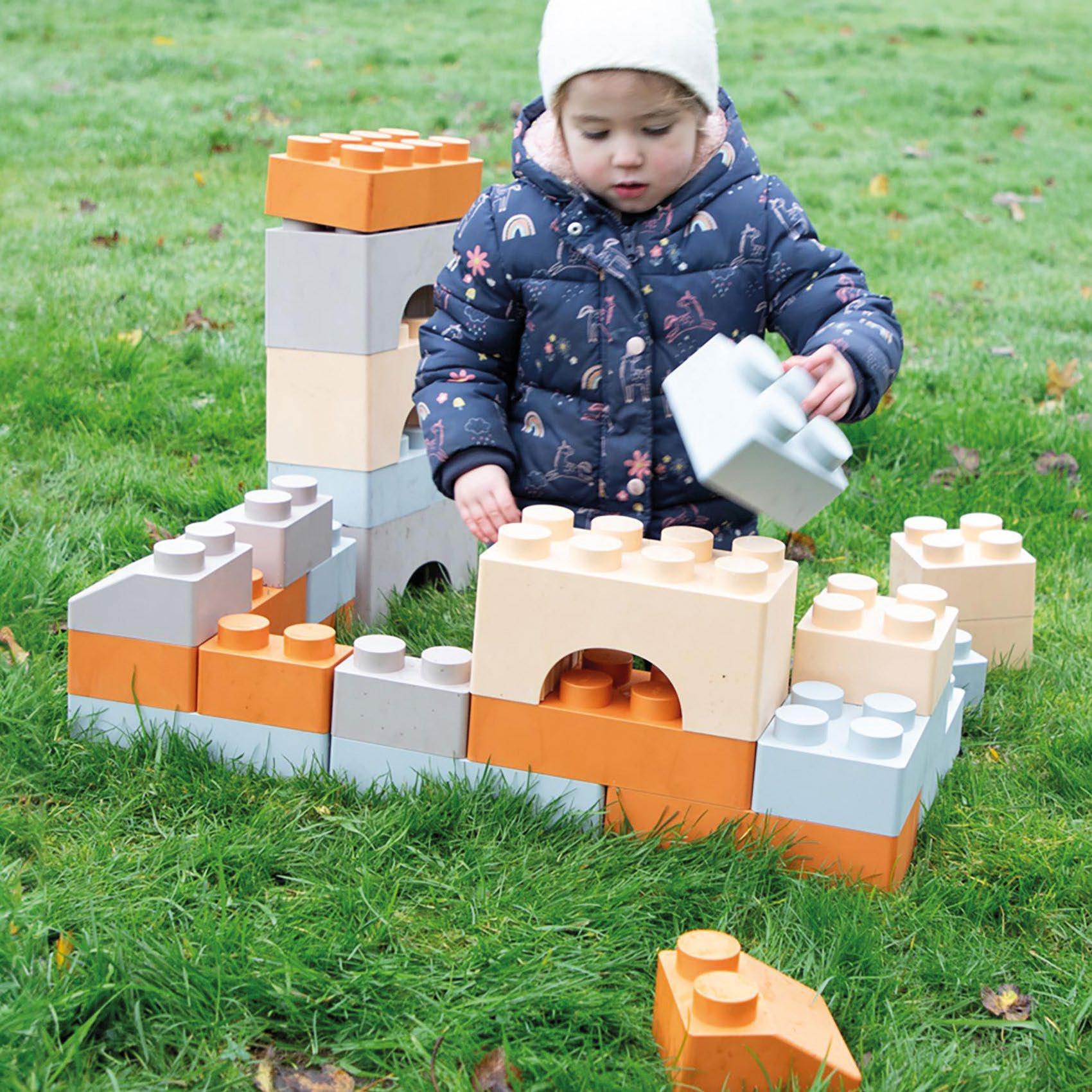





As a nursery business owner, you understand the importance of having a competent team to guarantee the success of your business. At dot2dot, we share your values and believe our people and network of strategic partners will serve as an extension of your team. Whether it’s an unexpected incident, a new venture, seeking advice, or making a change, we are always there to support you.
With 20 years of experience supporting nurseries like yours, we have acquired a wealth of knowledge and expertise we are eager to share with you.










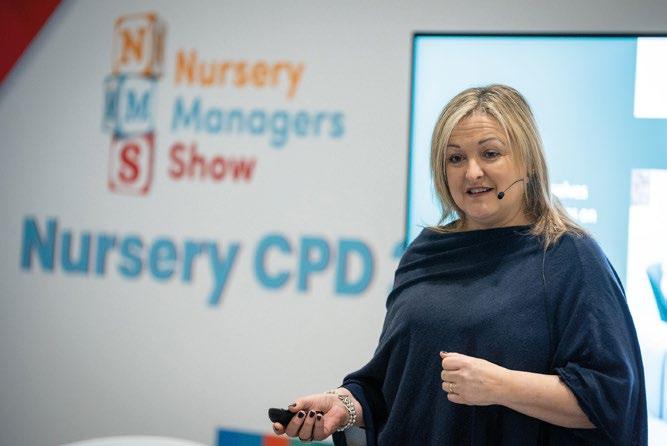
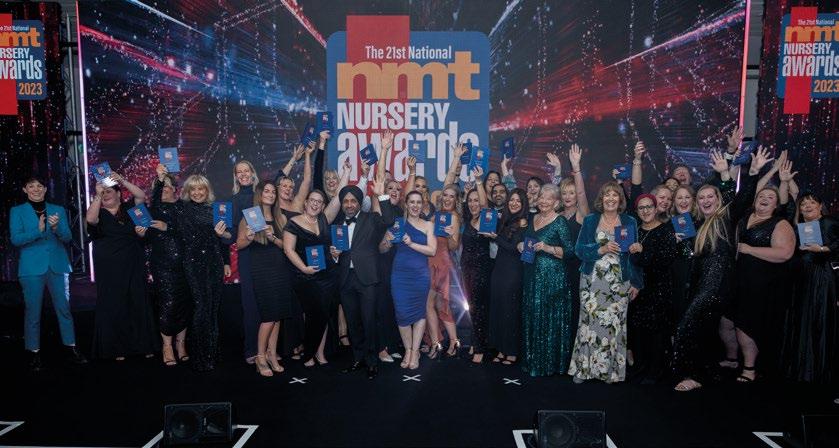

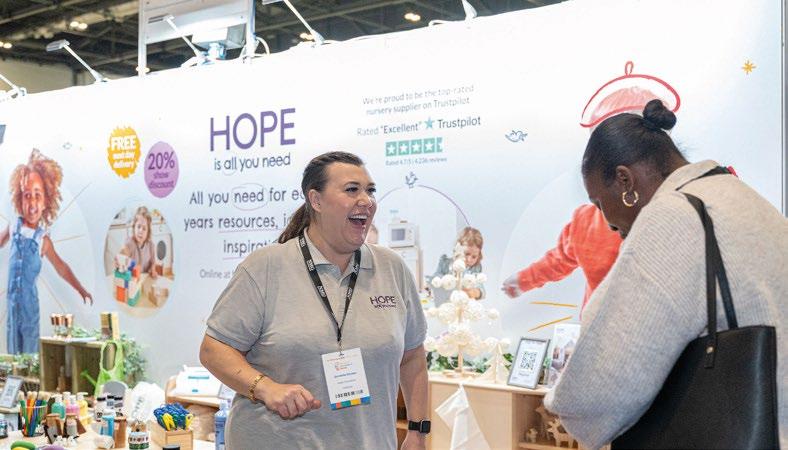


Chief operating officer
Sarah Hyman
Chief marketing officer
Julia Payne Business development director
Mike Griffin Advertising & event sales director
Caroline Bowern
0797 4643292 caroline.bowern@nexusgroup.co.uk
Event manager
Conor Diggin Customer success manager
Alba Chamizo Martin
Content marketing manager
This spring marked the beginning of a new phase of childcare support from the government and it’s clear that the early years will be a key policy battleground in the run up to the general election.
There’s never been this much attention on the sector, and, on a regular basis now, the early years and its experts are heard on the news, calling for better support and accessibility to funding.
retention play a critical role in the sustainability of the sector and experts from MBK Group and Realise share their insights on the various pathways into early years and where the support is most needed.
Kirsty Parks
None of the requests the sector has called for are new, but for the first time we have the attention of the government and its electorate. Keeping this momentum up will be crucial, but as early years leaders have pointed out, we must keep the government accountable for its pledges and commitments.
In April, parents in England were able to benefit from 15 hours of taxpayerfunded care for two-year-olds. Prime Minister Rishi Sunak said: “Last year we promised the biggest ever expansion in childcare provision this country has ever seen, and today we are delivering on our plan with 15 hours of free childcare for parents with two-year-olds.
“We want to give working families the peace of mind that they will be supported and our full expansion will save parents £6,900 a year – helping to build a brighter future for families and help to grow our economy.”
However, there are concerns from Labour and sector leaders that the government is continuing to ignore the increasing staff shortages and squeezed budgets.
In this issue, you’ll hear more from our field of experts on the start of the government’s pledge to expand childcare funding. Recruitment and
The next six months will see the sector continue to be a key policy for the election and while each party will be vying for the public’s vote, we must remember to monitor at each stage, that the expansion plan is fully covering the needs of the children, families and those working in the sector.


A recent Institute for Fiscal Studies report highlighted the critical importance that Sure Start centres have on children’s educational outcomes and development
The Sure Start network was launched by the Labour government in 1998 and introduced in 1999, and according to the report has continued to deliver longterm benefits to children. The findings point to the fact that young people from low-income households who lived close to a Sure Start centre achieved improved grades in their GCSEs.
As well as educational improvements, the research showed that having access to a nearby Sure Start centre increased the likelihood of children at early ages being recorded as having a special educational need or disability, but decreased the proportion of children with Education, Health and Care Plans during adolescence, compared to those who lived further away.
NDNA Cymru recently conducted a survey that revealed the financial pressure providers in Wales are under.
Participants across 102 private, voluntary and independent nurseries responded and 91% stated they expect to make a loss or just break-even.
Looking at staffing bills alone, providers expect to see an average increase of 15.2% compared to 14.7% last year. The survey showed that providers are working hard to support families by keeping fee increase to 9.3%.
When the NDNA asked providers about

the funding shortfall as a result, the average response was £1.91 per child per hour. This amounts to a startling £2,177 per child across 30 hours of early education and childcare offer across the year.
Purnima Tanuku, chief executive of NDNA Cymru, said: “It really is time for the Welsh government to commit to reviewing their funding rates to ensure sustainability for the sector. The minimum wage rise in April will further impact on the rising costs our nurseries in Wales are experiencing and the stagnant funding rate is simply not enough to cover their operating costs.
“If 91% of nurseries in Wales expect to make a loss or break-even this is just not sustainable. As a result we are likely to

see more settings close. If settings cannot generate any surplus then they cannot invest in staff or improving their learning environment.
The Joseph Rowntree Foundation (JRF) has suggested a new social licensing model amid calls to make childcare more affordable. The early years funding expansion plan, rolling out in stages over the next 18 months, means that by next year, the government will be funding the majority of early education and childcare.
However, the JRF stated that while the expansion will lower costs for many parents across the country, it doesn’t lower any financial burdens for providers.
It highlighted that other factors affected the sector besides funding have been overlooked and that there hasn’t been significant discussion about whether the sector is “being properly run and regulated ahead of a significant cash injection”.
The analysis shows nurseries backed by investment companies – including private equity firms, asset managers and international pension funds – reported double the profits of other private providers and seven times those of nonprofits.
JRF said the findings underlined the need for stricter controls on the sector. This would demand commitments on workers’ pay and value for money from nursery chains – potentially including a profit cap.

Nursery providers Bright Horizons, Childbase Partnership and Grace’s Day Nursery have been named in a list of the best UK workplaces.
Bright Horizons ranked thirteenth in the Super Large category at the Best Workplaces Awards, run by Great Place to Work. It is the nineteenth year that the nursery group has appeared on the list.
Ros Marshall, UK managing director at Bright Horizons, said: “We are very proud to be included in the UK’s best workplaces list again this year and are honoured to be the only company from the early years sector that has been included in this list for so long.”
Janine Leightley, HR director at Bright Horizons commented: “We are proud
“We are proud of our people and invest in them so they can be at their best. We have already established improved levels of pay as well as other forms of support for all our highly valued teams, from apprentices and graduates to deputies and managers.”
of our people and invest in them so they can be at their best. We have already established improved levels of pay as well as other forms of support for all our highly valued teams, from apprentices and graduates to deputies and managers.”
Childbase Partnership was ranked at 25 in the Super Large list, while Grace’s Day Nursery, which comprises two settings in Kent, ranked 28 in the Medium category. Organisations were ranked according to evaluations of employee survey responses and culture audits from leaders at each company.
Nursery group Busy Bees celebrated the achievements of 80 early years practitioners from across Scotland who gained qualifications through the group’s training provider Busy Bees Education and Training.
The learners included 38 practitioners who achieved a vocational qualification in social services (children and young people) and 42 who completed a leadership qualification.
Busy Bees and Busy Bees Education and Training held an annual graduation ceremony at Edinburgh’s Assembly Rooms.
Busy Bees’ co-founder Marg Randles said: “There are so many opportunities for people to progress in the early years sector
with the right education, training and support, and many of us within the Busy Bees leadership team have followed this journey.”
Stonehouse Nursery and Pre-School has relaunched following a £355,000 investment.
Located at Stonehouse Farm in Harbourne, Birmingham, the nursery has undergone a full refurbishment and rebrand becoming a Your Co-op Little Pioneers nursery and pre-school.
The refurbishment includes a new garden area for outdoor play, complete with a sandpit, climbing frames and growing garden.
The nursery will also have a forest school which will use the great outdoors to educate children and develop their confidence outside the home and classroom.
Tina Young, nursery manager at Your Co-op Little Pioneers Stonehouse, said: “We’re thrilled to be unveiling our newly refurbished nursery and garden at Stonehouse. Supporting children and families in both their education and happiness is at the heart of what we do, and this nursery will provide them with a great environment to develop into independent and confident young people.”
Essex County Council has launched a £1.4 million bursary scheme to support early years staff to progress in their careers.
The Poppins Bursary scheme will include fully funded courses for early years employees who may be new to the sector, delivered by training provider ACL Essex. Training is also available for people looking to return to the sector after a career break or to gain formal accreditation. Grants will also be available to help new childminders set up a business.
The bursary is being funded through the council’s Levelling Up fund, as well as ACL’s Adult Education Budget, which comes from the Education and Skills Funding Agency.
This bursary looks to create at least 90 new childcare places within childminder
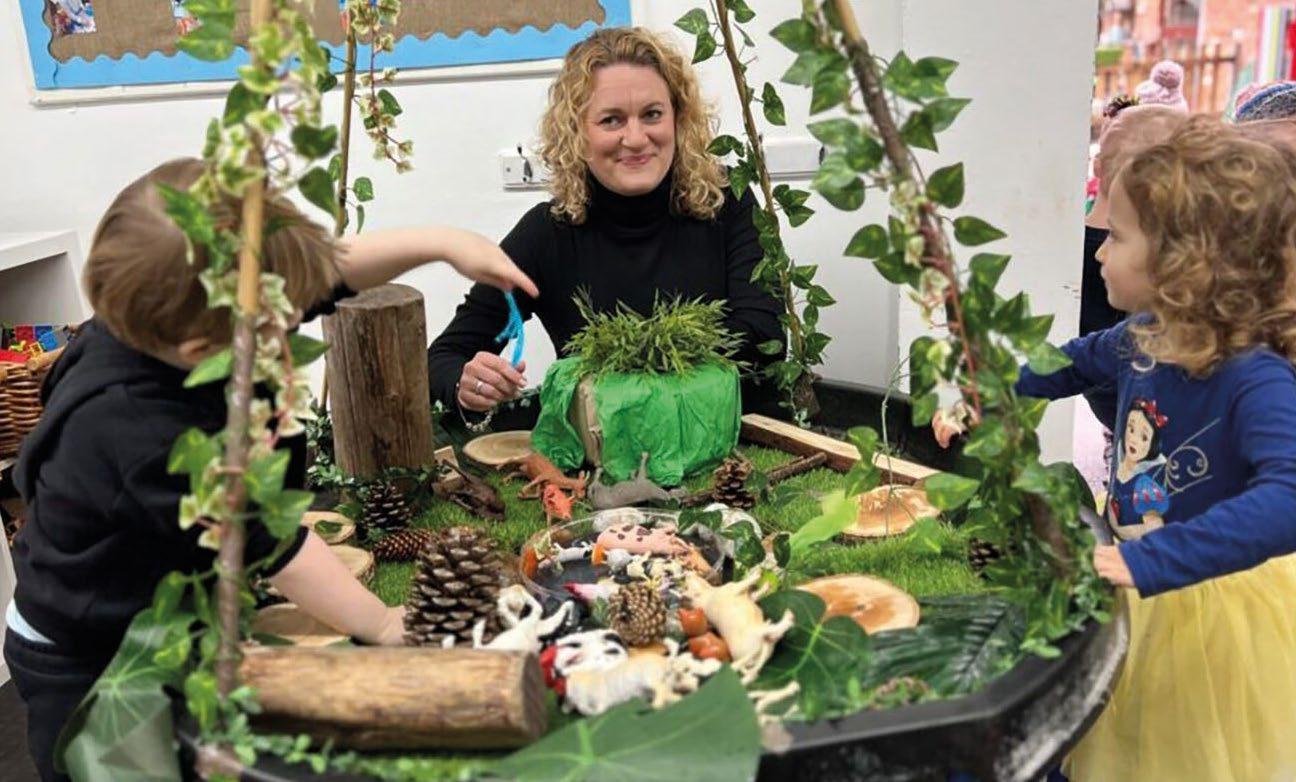
settings, 480 new childcare places in nursery type settings, and 75 specialist





Savills supports day nursery operators and investors through their property life cycle, with acquisitions, valuation, property advisory and consultancy services, through to transactional advice

Our team of national experts work closely with our regional advisors to provide what we feel is the best combination of knowledge for our clients
More information about our day nursery services can be found by scanning the QR code.
Jen Gill
+44 (0) 1244 702 055
+44 (0) 7929 854 411
jennifer.gill@savills.com
Jenny Nicol
+44 (0) 1865 269 106
+44 (0) 7870 403 843
jennifer.nicol@savills.com
Briony Richter speaks to Panash Shah, owner of Shelford Day Nursery in Cambridge, about the setting’s different approach to early years education
Describe your nursery’s mission and values
It’s very vocational and personal for us –we’re on a mission to deliver high-quality early years education with a STEM focus. Our vision from the start was to create an early years setting that harnessed the spirit of curiosity and experimentation that can be found in science, technology, engineering and mathematics topics.
The STEM aspect of the nursery was inspired by our proximity to the University of Cambridge, home of some of the world’s most important scientific discoveries.
We also have the renowned Cambridge Biomedical Campus right on our doorstep, so it seemed right to create a nursery that formed part of the area’s science community.
The entire space is geared to interactive learning. Inside the nursery, children have access to the latest technology, including interactive touch tables and a sensory room featuring colourful lighting and interactive fibre-optic installations.
A slide leads from the first floor of the building to our outdoor learning space, where the children have the opportunity to experiment with interactive water features, discover properties of different materials in sand and gravel pits and even
develop their first engineering skills in our construction zone.
Overall, our mission is all about sparking curiosity in young minds.
What are the benefits of a STEM approach?
Our STEM education approach has been designed to encourage children to ask questions, explore, experiment, and solve problems. We designed the nursery around hands-on activity, allowing children to explore their creativity as they design, build and experiment with various materials and concepts.
But we have also never lost sight of the importance of creating fun experiences that fire children’s imaginations and give them the freedom to learn in their own way. Our concept has always been that the combination of STEM and play should be the focus and starting point for the children’s holistic development.
In today’s digital age, technological awareness is also an essential skill, and we introduce children to basic concepts of technology, such as coding and digital literacy, helping them to thrive in an increasingly technology-driven world.
STEM forms the foundation for us to nurture cognitive, social, emotional and physical development, equipping children
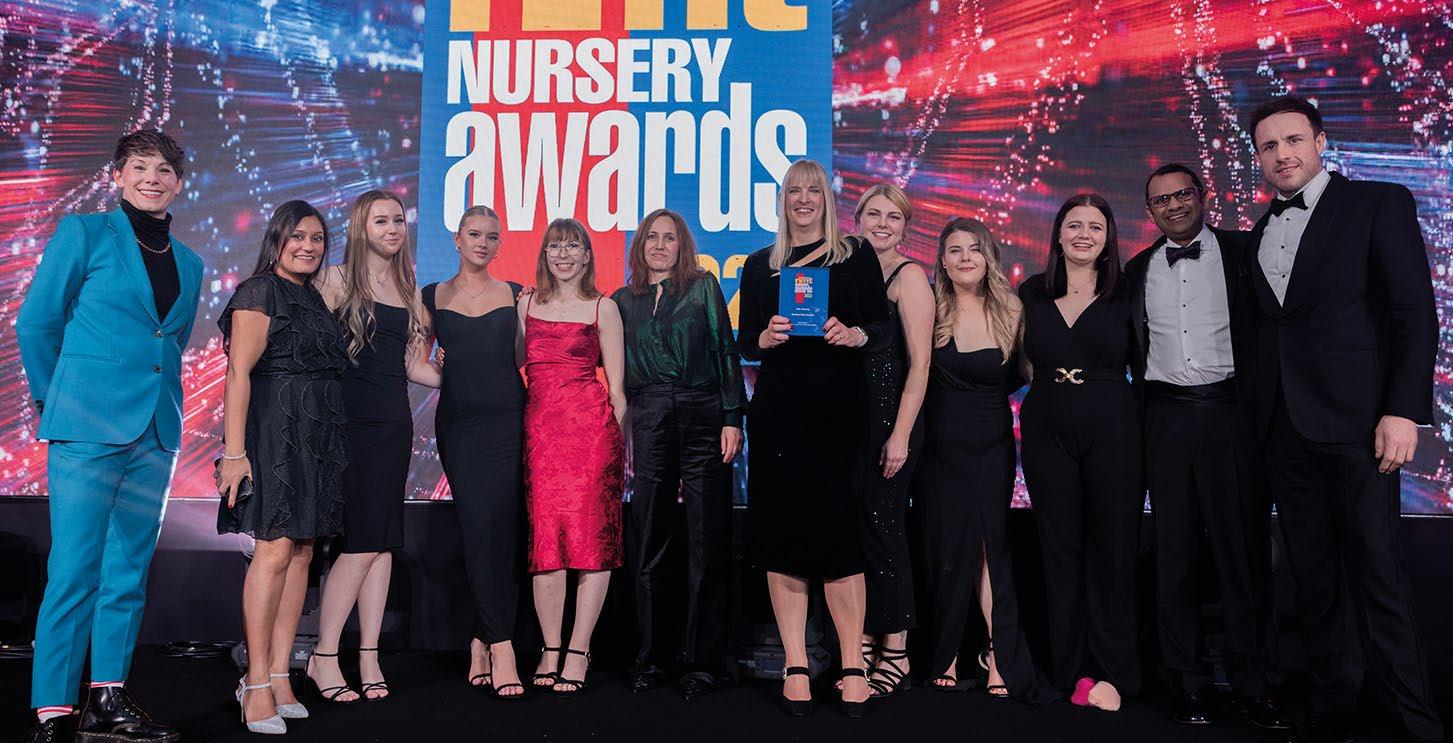

with essential skills and competencies for success in school and beyond – while also having lots of fun and gaining a lifelong love for learning.
How have parents responded? They love what we’re doing here. Being so close to the University of Cambridge and the Biomedical Campus means that many of our parents have a particular interest in STEM fields and have built their careers around these topics.
Parents feel that not it’s not just about preparing their child for a career, but also about teaching them to approach the world with curiosity and a problemsolving mindset.
Have you found it difficult to recruit and retain staff?
Recruiting and developing a strong staff team has been crucial to our success.We have been able to do well in terms of staff retention, and I think there are a number of reasons behind that.
The unique STEM aspect of our provision has been a big attraction for many team members – an opportunity to be involved in something new and
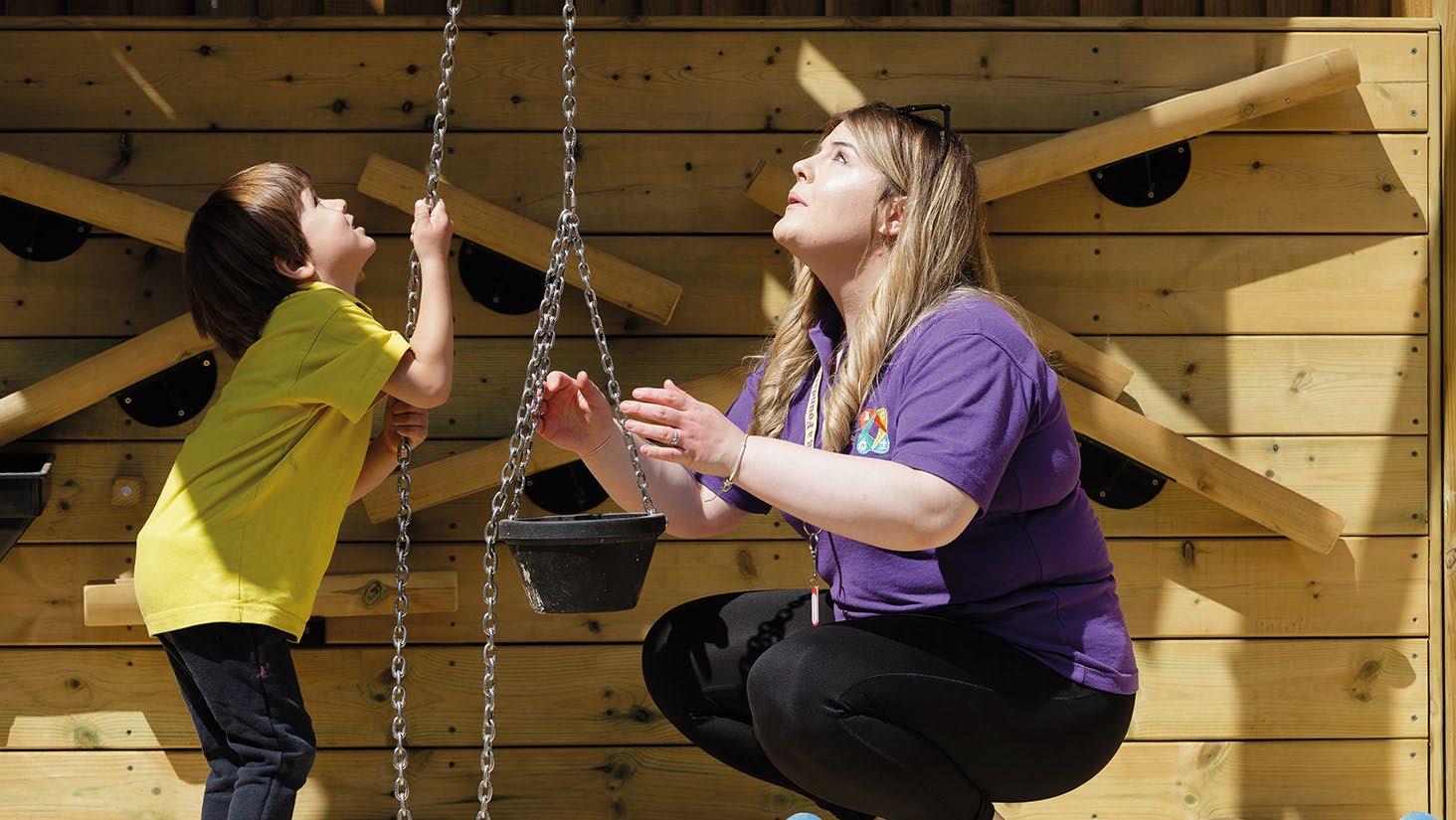
“Seeing staff members collaborate effectively and deliver high-quality care and education is very rewarding.”
innovative. As a result we have been able to hire qualified, compassionate and reliable educators who are passionate about working with children and meeting the high standards that we have set ourselves.
We have invested in training and provided professional development opportunities to ensure the team remains motivated and excited by the education we are providing. It’s certainly not an easy time for the sector, but we’ve been able to become a sought-after employer because what we offer is so special.
Why are there not more STEM settings?
There are lots of factors to this. First and foremost, there’s a large amount of specialist knowledge required in both early childhood education and STEM subjects. It’s taken a significant investment in training to get us where we are, and this perceived hurdle may discourage some individuals or organisations from starting such nurseries.
We have also been fortunate in that we
were able to find a location offering the kind of flexible indoor and outdoor space that’s needed to create a truly stimulating environment for the children.
There can also be a perception around STEM education being too complex or not suitable for young children. We hope our success shows that STEM works for early years education and inspires more nurseries to embrace this experiential learning style. We would love to see more nurseries around the country going down this route.
What have been your most rewarding moments?
Seeing staff members collaborate effectively and deliver high-quality care and education is very rewarding. Building a strong team and witnessing their achievements and growth makes me very proud.
Also, accomplishing milestones and achieving goals set for the nursery is massively satisfying, whether it’s related to quality improvement, enrolment growth or financial sustainability. Seeing the vision for the nursery come to fruition through strategic planning and effective execution has been a fantastic experience.
Ultimately though, it’s all about the children. In the bigger picture, it’s amazing to witness the growth and development of the children attending the nursery and see the impact of the positive, nurturing environment that we’ve created.
What have been your most significant challenges?
The biggest challenges came in the startup phase. It took time and effort to find the right location and then perseverance and determination to secure planning approval and get the setting ready for use.
Alongside this we had to recruit and train our initial staff cohort in a challenging market. As I said earlier, we have now attracted and developed a strong staff team – it takes ongoing effort and reflection to establish and maintain a positive organisational culture and ensure that we’re constantly living our values.
Can you share any valuable lessons or advice?
First and foremost, the most important thing we did was identify what sets our offering apart from competitors and highlight these unique selling points. Differentiation can attract parents and help your business stand out.
Create a comprehensive business plan that outlines your goals, target market, services offered, pricing strategy, marketing plan and financial projections. A well-thought-out business plan will guide your decisions and increase your chances of success.
Once you have a vision of what you want to achieve, you need to be courageous and determined to make it happen.■
As the first phase of the government’s childcare expansion plan rolls out, Briony Richter examines the policy and the sector’s response
In his Spring Budget last year, chancellor Jeremy Hunt announced that there would be a £4 billion expansion of ‘free’ childcare to parents of all children aged under five from the moment parental leave ends.
Prior to the roll-out, 30 hours a week of funded childcare was available for working parents with children aged three and four. That however is limited to 15 hours a week if at least one parent earns more than £100,000.
Now working parents with two-yearolds are eligible for 15 hours a week of funded childcare. The plan’s three phases are:
• April 2024: 15 hours childcare a week for two year olds.
• September 2024: 15 hours childcare a week for nine month olds.
• September 2025: 30 hours childcare a week for all under-fives.
In order to be eligible for the new hours, the majority of parents must earn more than £8,670, but less than £100,000 a year.
Education secretary Gillian Keegan said: “This is a landmark moment, and I am extremely proud to see we’re on track for more than 150,000 children to take up government-funded places under our new offer. This will be a lifeline for working parents, building up to this government’s plan for the most
“In order to be eligible for the new hours, the majority of parents must earn more than £8,670, but less than £100,000 a year.”
comprehensive childcare support in this country’s history by 2025.
“Support with childcare costs has an enormous ripple effect, freeing up parents to increase their hours at work and put more money in their pockets, or giving them the security to try out a new career or passion. It also contributes to economic growth and opens up new career opportunities in a hugely rewarding sector.”
Helen Dickinson, chief executive of the British Retail Consortium, said: “The cost of childcare remains one of the biggest challenges to many parents, preventing many who wish to re-enter the workforce. As the largest private sector employer, we welcome the expansion of childcare provision that is being rolled out, and the support it will offer to many of our colleagues and potential colleagues, now and in the future.”
Labour’s reaction
Labour has now pledged to keep the government’s expanded childcare hours if the party wins the general election. This came after suggestions that Labour would review the childcare offering. Shadow minister Nick Thomas-Symonds said the party wouldn’t reduce the number of hours of government-funded childcare that working parents would be entitled to in England.
The Institute for Fiscal Studies has estimated that the scheme will double the funded childcare entitlement budget from £4 billion last year to £8 billion by 2027-28.
While Labour has promised to uphold the roll-out, it has raised significant concerns about the availability of nursery places and the financial challenges facing providers.
In March the party released what it dubbed its “dossier of childcare chaos”,
“While Labour has promised to uphold the roll-out, it has raised significant concerns about the availability of nursery places and the financial challenges facing providers.”
stating: “Fourteen years of Conservative failure in early years has left families facing even greater costs for childcare, with England’s childcare system now one of the most expensive in the world, forcing parents to scale back on working hours or even give up work altogether against their wishes.”
The party highlighted research by the charity Coram, which found that a parttime nursery place for a child under two now costs an average of £158 a week in Britain, up 7% on 2023.
The expansion plan is certainly a move in the right direction and will undoubtably help many providers across the country.
Chris McCandless, chief executive of Busy Bees Europe, said: “We welcome the government’s continued commitment to expanding support for early years education. The increase in funded hours will help working families and give more children the best start in life, and we’re really pleased that the rollout has been accompanied by the clarity on future funding rates we needed to invest in creating the additional capacity required in our centres.
“We’ve already seen a significant increase in interest in our nursery places

“We’ve already seen a significant increase in interest in our nursery places in recent months from parents looking to make use of the funded hours, and expect to welcome more children to our nurseries this year and in subsequent years as the scheme expands further.”
in recent months from parents looking to make use of the funded hours, and expect to welcome more children to our nurseries this year and in subsequent years as the scheme expands further.”
Ashbourne Day Nurseries’ managing director Jo Turley said: “At Ashbourne Day Nurseries, we welcome the extension of government funding in early years childcare and education as a positive step forward. Quality early years education is foundational in shaping a child’s future, and we eagerly anticipate any benefits this extended funding will bring to families across our nurseries and the broader community.”
However, leading sector organisations have highlighted the continued
challenges for capacity, costs and staffing. Purnima Tanuku, chief executive of National Day Nurseries Association, said: “Increasing investment in our children’s early education and care can really pay dividends in terms of their long-term life chances and supports working families. That makes our sector a critical element of our social, educational and economic infrastructure.
“We know that providers have been working extremely hard to be ready for [the] roll-out but they face extremely challenging circumstances including last-minute funding decisions, workforce shortages and getting access to capital support to expand. In our recent survey almost half of providers said they

of their children.
“We know that providers have been working extremely hard to be ready for [the] roll-out but they face extremely challenging circumstances including last-minute funding decisions, workforce shortages and getting access to capital support to expand.”
didn’t believe they would be able to offer extra places. Parents may find that there aren’t places in their first-choice areas and we know parental choice is crucial when it comes to the care and wellbeing
“Looking ahead we hope the government will continue to work with providers and the sector on initiatives to improve recruitment and retention, address funding shortfalls for three and four-year-old places and support providers with challenges like capital funding and business rates burdens.”
Neil Leitch, chief executive of the Early Years Alliance, commented: “If there is one thing that the first phase of the entitlement expansion has shown, it’s that simply promising ‘more free childcare’ is meaningless if you’re not willing to invest in the infrastructure needed to deliver it.
“As our own research shows, nurseries, childminders and pre-schools are already facing severe capacity challenges, with 68% of settings full before the expansion has even begun – and as a result, many have had no choice but to limit the number of new funded places they offer.
It’s completely unsurprising, therefore, that many parents accessing a place for the first time have found it difficult – if not impossible – to do so.
“Meanwhile, a combination of sustained underfunding and minimum wage rises has forced many providers to increase fees at an even higher rate than normal just to stay afloat – meaning that even those parents who have been able to access places are likely to see sharp increases in the cost of any paid-for hours.
“With just five months to go until the next phase of the expansion, which is likely to result in an even greater increase in the demand for new places, it’s clear that urgent action is needed from government.”
It’s clear that this year, childcare will play a massive role in the election and it’s up to the government to prove this roll-out can fully support the needs of nurseries and its workforce. ■
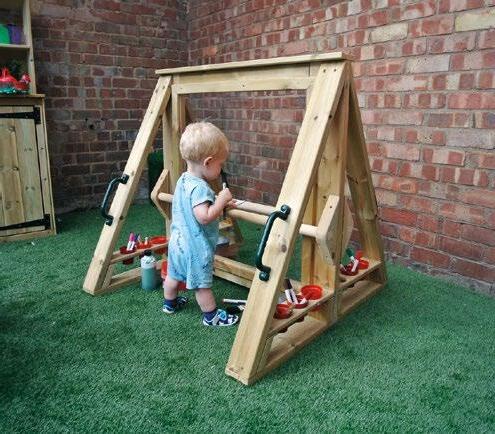

Over 4,000 in attendance

Wow it’s tricky navigating this early years funding system. With each step of the funded process there has been complications and disjointed grey areas. The team at Nursery In a Box speaks to NMT about the current funding challenges facing nurseries
With so many changes happening around funding it’s not surprising that many nursery owners and managers are fearful when it comes down to funding hours. So we thought it might be helpful to dive into the detail and help you figure this out. Nursery In a Box have over 20 years’ experience managing funded hours and expert knowledge on the complexities of applying these to your invoices. We take a look at how digital technology can help you manage this, and understand the impact funding may have on your nursery or pre-school business.
The secret sauce to your fees and funding is to keep it simple. Understand which booking patterns are the most popular and generate the most revenue and keep them simple to maximise your revenue, improve occupancy, drive staffing
“One of the most common mistakes we often see is an over-complication of fees, over-discounting and fear of funding shortfalls which all have a negative effect on the business which can all be avoided.”
efficiencies and make it easy to apply your funding hours. Understand how much of your revenue is dependent on funding hours and what your shortfall is.
One of the most common mistakes we often see is an over-complication of fees, over-discounting and fear of funding shortfalls which all have a negative effect
on the business which can all be avoided.
Be careful as many nursery management systems don’t invoice or apply funding correctly and it’s usually at your expense. If you get lots of invoice queries or funding complications then maybe it’s time to consider a better management system like Nursery In a Box.
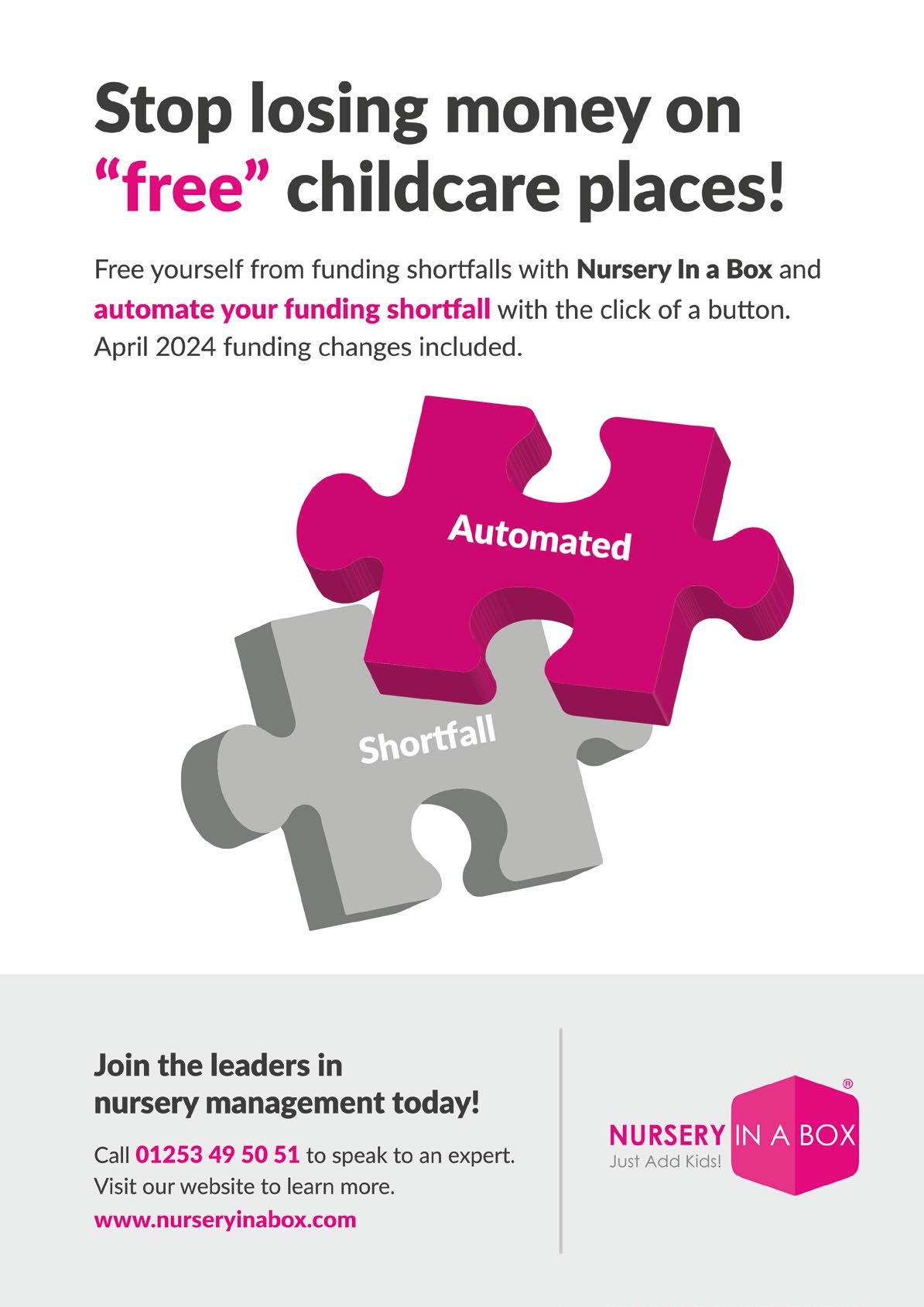

“Nursery In a Box can easily handle all the complexities of invoicing and funding claims so you’re accurate to the penny.”
With the phased roll-out of the UK governments expanded childcare offer from 1 April 2024, which sees working parents of two-year-old children offered 15 hours’ ‘free’ childcare and ninemonth-olds from September 2024, we have upgraded our current management system to account for these changes with funding hours easy to apply, calculate and claim.
We know how resilient the sector is and the demand for places continues to rise. With increased demand for places it’s really important that you track and manage enquiries effectively in addition to your waiting list. We provide website and social media forms for parents to easily apply online for places and make it easy for nurseries to track conversion rates and manage all enquiries in one place using our simple Enquiry Tracker.
For many the funding received from the local authority does not cover the full cost of a child’s care and to remain sustainable a charge for meals, snacks, consumables, extra hours and additional services may be required. With lots of noise around the two-year funding rates it’s very important to keep your eye on the three-to-four-year rates as this is probably where most of your funding revenue comes from and also where your biggest funding shortfall is.
First, we would look at how much revenue comes from your funding places. Across our network of 500-plus nurseries and pre-schools, we often see two trends in where revenue comes from. You are either a 20% funded nursery or you’re a 80% funded nursery. Each one places questions over sustainability.
As an example, if you receive 15 hours funding for three-to-four-year olds at £5 per hour and your daily charge is the national average of £6.50 per hour, then you would have a funding shortfall of £22.50 on a 15 hour funded child. This would equate to a funding shortfall of £42,750 per year based on 50 children attending 38 weeks in the year. It gets even worse for 30 hours children. This is clearly unsustainable for most nurseries and preschools in the UK.
At Nursery In a Box we make it easy to see your funding shortfall so you can
decide how to apply meals, consumables and additional services correctly and accurately.
Easy to apply and claim your funding hours
With over 20 years’ experience we try and make it as easy as you can to apply and claim funded hours
• Auto apply funding hours
Easy to apply funding hours to all of your funded children with the click of a button.
• Automate funding shortfalls
Automate your funding shortfalls with the click of a button and let technology do the work for you.
• Produce your funding claim form
Your funding claim forms itemise each child’s funding hours whether you apply funding to a term or stretched across the year so it’s clear to see and therefore reduce funding queries from your parents.
In summary
Nursery In a Box can easily handle all the complexities of invoicing and funding so you can remain sustainable and maximise your revenue.■

Sophie Willcox, director, childcare and education at Christie & Co highlights some key considerations when buying a day nursery business
Whether it’s your first acquisition or your fourth, deciding to buy a day nursery business can be a bit daunting. Here are some key things to bear in mind that will stand you in good stead.
Are you looking for a setting with a particular unique selling point, like a beach school, a forest school, or perhaps a bilingual nursery? Is there a particular teaching methodology that you feel aligned with, such as Montessori, Reggio Emilia, The Curiosity Approach, or Froebelian?
Having an understanding of the different ways that early years care can be delivered may help you decide the right fit for you.
The location of the nursery will be crucial for attracting parents, so consider local demographics, proximity to residential areas, and accessibility. If you’re in a town, what are the transport links like, or is the nursery situated near a new housing development? If you plan to work in the nursery yourself or to visit each week, also factor this into your search.
“Having an understanding of the different ways that early years care can be delivered may help you decide the right fit for you..”
Consider each nursery as it arises based on how it differentiates itself and attracts families. Is there potential to improve what that nursery currently does and therefore an upside to your purchase? It’s also important to research the competitive landscape in the local area, including other nurseries, childcare options, and pricing strategies.
Whether you are looking to by a small setting or a 100-plus place nursery will largely depend on your operational expertise and funding abilities. Each sized nursery has pros and cons, so understanding what feels right for you will narrow your search. With a larger nursery, you will need more staff and resources, but your earning potential is higher if your occupancy is strong. Furthermore, some smaller settings of, say, 30 to 40 places can be very profitable depending on the fees they charge, so understanding the nuances of each nursery is important.
A key part of your search will be underpinned by what you can afford, so speak with your bank or finance broker about your circumstances to ascertain the level of borrowing you can achieve. This will enable your agent to show you affordable opportunities and give the agent the confidence that you can deliver on an offer you make.
Now you have selected a potential nursery to buy
Reputation and quality of care
Research the reputation of the nursery you’re considering buying – look at

resources such as reviews, Ofsted reports, and word-of-mouth recommendations.
Check the setting’s Ofsted report to read how it delivers the EYFS and the recommendations made by the inspector. We also recommend visiting the nursery to get a feel for the quality of care provided – check cleanliness, safety measures and staff qualifications yourself. Nurseries come alive with staff and children in them and a visit as a prospective parent can provide you with valuable insights.
Speak with your agent to understand how the asking price has been arrived at and to discuss the nuances of that business. Are the wages as you would expect against the turnover? Are the EBITDA/R margins as you would hope? By reviewing the accounts, you might spot an opportunity to add value.
Consider potential areas for growth post-acquisition – is the nursery ready for a fee increase, or could you access

additional funding going forward? The financials of the business help paint a picture of what the business is currently doing and is set to do. Some owners can provide projections based on forward bookings which is invaluable knowledge for you as a buyer.
Consider if you plan to work in the nursery yourself and, if so, whether you have the right qualifications. If you feel more aligned to an overseeing role, it’s important to search for management-run settings or go in with the knowledge you might have to employ a new manager as part of the process.
Familiarise yourself with the roles that you will need to replace when the existing owner leaves. We see owners’ involvement in the day-to-day running spans a wide spectrum, so knowing what would fit you is key.
Be mindful that most nurseries that come to the market are listed as confidential and staff are not made aware of the sale until the transaction has completed in the case of share sales, or just before the proposed completion
in the event of an asset sale. This is to maintain stability within the team and among the parents and so it’s normal for you to not have access to the staff until this time.
Assess the condition of the nursery premises, including indoor and outdoor facilities, play areas, and resources.
Are you wanting to do very little to the setting or are you looking for something that you can improve upon/upgrade? Each opportunity is different and knowing what you want to take on will help you decide what is right for you.
Offer accepted – what’s next?
Once you’ve had your offer accepted, now is the time to instruct the right advisors to help. A solicitor who is experienced in the sector can be invaluable, as can a good accountant to help with your financial due diligence. Get in touch with Ofsted to begin your registration process, and start your application for an enhanced DBS. If you think you will need some guidance on the registration process, why not speak
“Consider potential areas for growth postacquisition – is the nursery ready for a fee increase, or could you access additional funding going forward?”
with a consultant or with the current nursery owner who will probably be more than happy to help.
Understanding your long-term goals can help guide you in what to buy, for example, do you plan to operate the nursery indefinitely or eventually sell it? Would you like to acquire freeholds that you will eventually create leases to sell and retain the properties as an investment? Do you not want to tie up money in freeholds and therefore a lease is a better route for you? If so, consider the saleability of that lease in the future.■
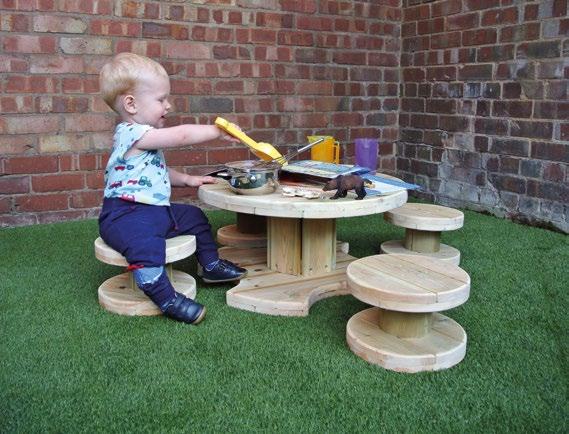
Learning about foods plays an important role in a child’s nursery experience and is closely tied to the adoption of healthy eating habits in the short and long term. Fran Box, project manager at TastEd and Kim Smith, PhD researcher at Centre for Food Policy, University of London, explore the benefits of incorporating food in play
When looking at food in the early years foundation stage (EYFS) statutory framework, it primarily focuses on children’s consumption of healthy diets and on safety guidance.
Our approach to food education involves exploration using all the senses to help children learn to love healthy foods. It is a free, simple and fun tool for learning and development, that can address many of the prime areas of learning development. As guidance by the Department for Education’s early years team highlights, sensory food education such as TastEd can be used in any EYFS setting.
TastEd provides sensory food education training and resources to early years practitioners and primary schools across the UK, to ensure all children have the opportunity to explore and try vegetables and fruits with the senses. Activities are based on the Sapere method used around the world, including in Finland’s mandatory early years curriculum, to help children establish the foundation of a healthy diet through developing a preference for
“Children are trying more food, and the fruit and veg [they] bring in each morning are more diverse. We also have more variety in the snack bar now as a result of TastEd.”
healthy foods.
It has been shown that children are more likely to eat food they like, and they like foods that are familiar. Through simple, age-appropriate activities, nurseries can give children frequent, hands-on opportunities to become familiar with new foods harnessing their natural curiosity and sense of fun.
Learning through play with food helps build familiarity and can lead to an increased acceptance, willingness to try, and even liking of new vegetables and fruits frequently. Young children can find new foods become more appealing in a different setting surrounded by friends and trusted adults, away from the pressure of a mealtime. Harnessing the senses is nothing new for early years practitioners, so using sight, smell, touch, hearing and taste to explore vegetables and fruits is a simple, familiar approach that can be used much more than just at lunchtime.
Sensory food education not only helps children to learn the importance of healthy eating but, more importantly, gives them the skills and opportunities to learn to eat those healthy foods. Meanwhile, this unique, simple and fun food-based learning can simultaneously address multiple parts of the EYFS prime areas of learning and development. Below are 10 ways TastEd can be used to help nurseries bring food sensory play into their daily routine:
2. Acknowledging how each child is on their own ‘food journey’. TastEd principles allow children to go at their own pace, maybe only holding a new food to begin with, before being brave enough to smell or lick it maybe days or weeks later. It’s not about forcing children to get used to a food, or even like it, but explore on their own.
3. Supportive adults are key to TastEd’s success in early years settings, with staff modelling, as they do throughout the day, how to explore a food, sharing their own experiences and gently asking children to share theirs.
4. Food is a universal topic that everyone can discuss, which means all children can engage in the activity, sometimes even drawing out the most reluctant child. Discussions with children during TastEd activities helps them develop their communication skills through back-and-forth conversations with peers and adults, a key element in all TastEd activities.
1. The Golden Rules of TastEd are “You don’t have to try” and “You don’t have to like”, which embraces the uniqueness of each child. Based on the understanding that we all have different likes and dislikes, TastEd enables children to know, understand and accept their own preferences and to consider how they are also different to other people.
– practitioner, College Green Nursery School, London Portland Kindergarten

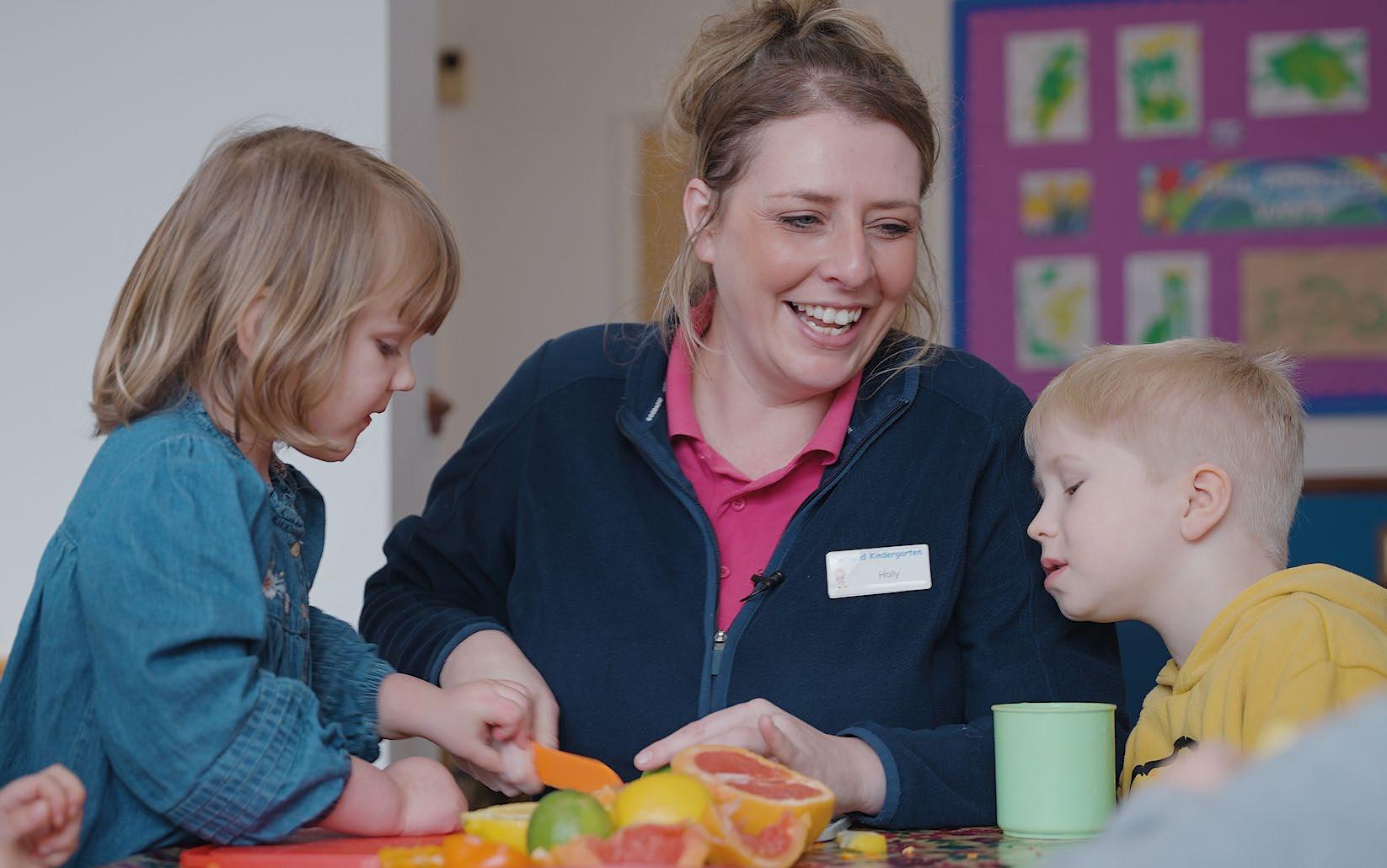

5. Food is a rich, familiar context for developing a child’s vocabulary including colours, shapes, textures, food names and the senses. It can also prompt vocabulary specific to each child, for example, linked to their personal experience with a fruit or vegetable at home.
6.TastEd’s experiential, sensory approach helps children to use their senses to develop fine motor skills incrementally. This could include simply picking up and touching individual berries, peeling a banana or satsuma, or even
playful exploration of rolling sprouts down a tube. For older children, it could extend to include chopping soft foods using child-safe knives or helping to prepare snacks.
7. There are a range of activities using tools that provide plentiful moments to practise playing around food, such as cutlery, mixing bowls and spoons or jugs for pouring. For example, the ‘Looking at Apples’ activity which includes a tuff spot idea (learning tool) for exploring apple slices, fresh mint, jugs, bowls, cups and water.
8. All TastEd activities provide children with multiple occasions to explore and understand their feelings such as when tasting an unliked vegetable, in relation to a specific sensation, or through engaging with their peers during the activity. TastEd encourages practitioners to support children in developing their unique taste and sensory preferences.
9. TastEd supports practitioners to foster strong relationships with families through resources for parents and sharing a child’s TastEd experience with their family. Resources about TastEd principles and activities for parents to try at home are available for practitioners online to share.
“The language, discussion and vocabulary which comes out in the sessions have been awesome. I deliver the sessions to the whole class and it has been a time of bonding over food, which has been really special.”
– EYFS teacher, Charvil Piggott Primary School10. Finally, TastEd activities and resources enable early years practitioners to help children to learn to love eating a wide selection of vegetables and fruits, in support of a healthy diet. Using TastEd in EYFS settings therefore not only supports the prime areas of learning and development, but also ensures children learn to love eating the fruits and vegetables that are served at meal and snack times. Children who discover a new love for cherry tomatoes in a gentle TastEd activity may then choose to eat them at snack time.■
Discover Connect Childcare – your go-to for seamless billing management. Streamline your processes, save time, and ease your stress with our all-in-one platform.

Make the switch
Make the switch to Connect Childcare now for a seamless invoicing experience in time for the new term this September!
Enjoy a smooth setup with a personal onboarding manager, ensuring no productivity loss!
Lock in your savings
Our prices are steady, and you can enjoy a 20% discount to mark 20 years of Connect Childcare in the sector.


, chief executive of Flexible Childcare Services Scotland explores the funding
There is currently significant recruitment and retention challenges across the sector and it’s the government’s role to interject and support the workforce.
The Scottish government’s expansion of early learning and childcare means that all three and four year olds and those two year olds whose family circumstances meet eligibility criteria are entitled to 1,140 hours a year of funded (not free) early learning and childcare. At its core it’s an admirable policy, and it does help a significant number of families, with high take-up levels recorded, particularly for three and four year olds, and slightly less successful take-up levels for two year olds.
Sounds good? Well, yes, at a policy level it does sound good, but as is often the case the situation on the ground isn’t always a reflection of the policy or its
So, what’s the problem?
Let’s start by looking at some stats. A recent report from campaign group Pregnant then Screwed, showed that:
• 28% of parents reported having to choose between paying for childcare and household essentials.
• 42% of parents said that they spend more than a quarter of their household income on childcare – and for 15% it’s more than half.
• 84% of mothers said that childcare costs are equal to, or exceed, their income.
• 85% of parents said that childcare costs are a barrier to having more children.
• 94% of parents don’t believe that the Scottish government is doing enough to support families with childcare.
Joeli Brearley founder and chief executive and Pregnant Then Screwed said: “The government has promised parents that they will soon be able


“Add to that the worrying number of nursery providers and childminders that are closing, the recruitment challenges that see services limiting capacity, and the cost of living crisis, and the picture is far from rosy.”
to access more affordable childcare, but this will only be successful if the scheme doesn’t bankrupt childcare providers. We’ve already seen that the roll out of the new funding has not been straightforward with many parents still waiting to hear if they will be able to secure a funded place, whilst many others are complaining that cost savings
are minimal due to significant price increases for childcare costs outside of the funded hours. It is clear that after years of disappointment, parents are struggling to believe the promise that things will get better.’’
This shows that despite the Scottish government’s expansion of early learning and childcare, it clearly isn’t meeting the needs of parents.
We also know that despite reported strong take-up levels, the policy still fails to meet the needs of many. Those in insecure, low-income, or shift work, those on zero-hours contracts, single parents, and those whose child has an additional support need are often failed by this policy and struggle to access their funded hours. Tackling child poverty targets will never be met if we fail to meet the needs of our most vulnerable families.
Add to that the worrying number of nursery providers and childminders that are closing, the recruitment challenges
that see services limiting capacity, and the cost of living crisis, and the picture is far from rosy.
The challenges of local government managing and administering a national policy play a big part in the problems facing Scotland’s early learning and childcare sector. Our local authorities are not only the gatekeeper of the funding, but are also a recipient of that funding, a situation which must be addressed if we are to solve these problems.
The increase in the Living Wage in Scotland to £12 an hour came with a commitment from the Scottish government to provide £16 million in additional funding to local authorities to enable childcare workers delivering funded early learning and childcare in private and third sector services to be paid at least £12 an hour from April
“Childcare must be recognised as a key part of our national infrastructure. Without it parents can’t work, employers struggle to recruit, and the economy suffers.”
this year. The percentage increase on the Living Wage was 10.1%, yet despite the commitment to fund this increase, the additional funds to be awarded to Scotland’s private, voluntary and independent sector provider is just 7.6% an hour.
There is an expectation that local
authorities will also apply an increase to cover the cost of living rises and investment in services, yet these commitments are slow to appear – and ask Scotland’s providers and most will tell you they are fearful that this won’t happen across all 32 local authorities.
For decades the childcare workforce has been underpaid and undervalued. Steps to drive up pay rates are a good thing, and are supported by employers in the sector, but to achieve this funding must be set at a sustainable rate.
How do we meet childcare costs fairly for all?
There’s no getting away from the fact that delivering good-quality early learning and childcare, provision for infants, and school age childcare, comes at a cost. We need to find a way to meet that cost fairly, sustainably and equitably.
Nothing should be off the table when
considering this, including ring fencing, tax changes, a childcare levy on large employers, an independent review of how current funding is spent, and targeted spending priorities.
Childcare must be recognised as a key part of our national infrastructure. Without it parents can’t work, employers struggle to recruit, and the economy suffers.
Childcare delivery models haven’t changed in decades, but just because we’ve always done it like this doesn’t mean it’s right. It’s time for review and change to create a responsive childcare system.
Childcare alone cannot solve this challenge, we need parent-friendly employment practices, and reliable and accessible travel solutions to form part of the picture too. This means cross-portfolio working within government has to form part of any planned solution. ■

With the current recruitment challenges still rife, many nurseries are looking to improve ways to support staff with their personal growth plans. NMT explores what some nurseries are offering
Low staff turnover and retaining staff are critical to a successful setting, but external factors beyond nurseries’ control are forcing many people to avoid entering the sector and qualified staff to leave it.
However, the sector is an innovative and resilient one, and many who work within it are delivering tailored approaches to wellbeing, training and career development.
The truth of the matter is that the funding for the early years has never matched the requirements of the sector. Even with the government’s expansion plan, many nurseries will continue to experience financial hardship, leading to more difficulties for recruitment.
To improve retention rates for the long term, providers are turning to new work styles and ways of upskilling to entice new entrants and hold on to the talent.
The benefits of training and development
Evidence points to the fact that well trained staff are the key to quality care and education of our youngest generation. Staff who feel valued and confident in their skillset are far more insightful in their duties, more productive and are great at boosting morale, as they can
“Training
and development also helps improve the collective knowledge in your organisation, prepares you for when the Ofsted inspector comes knocking, and proves to parents that your staff are highly skilled.”
provide help, support and mentoring to new or inexperienced staff.
Training and development also helps improve the collective knowledge in your organisation, prepares you for when the Ofsted inspector comes knocking, and proves to parents that your staff are highly skilled.
The London Early Years Foundation (LEYF) provides high-quality continued professional development (CPD) and training to all those across the sector and those wanting to join.
It offers a range of training courses and qualifications which it makes as accessible as possible. LEYF offers both a foundation degree in early years services, a two-and-a-half-year course accredited by the University of Wolverhampton but delivered and assessed by LEYF tutors. LEYF also offers a bachelor’s degree in early childhood studies as a top up.
Although the group points out there’s a cost to the courses, most people will be eligible for funding if they don’t already have a degree. If you work for LEYF, you will be paid your full salary on training days.
LEYF also offers its Chef Academy, as well as leadership and management programmes and apprenticeships.
Childbase Partnership, an employeeowned nursery group, has invested significantly in its training development programmes. In 2021 the group launched its Training Academy of Excellence that delivers apprenticeships for learners wanting to join or progress within the sector.
It offers apprenticeships at Levels 2 and 3 in early years, alongside functional skills support if required. The group’s curriculum ‘Teach to Reach’ forms part of the course for the Level 3 apprenticeship.
There’s been a worrying rise in the number of children reported with SEND, but even more concerning is the lack of funding and support available to train staff members.
Recently, Coram Childcare released the findings of its 2024 survey which showed a “dramatic” decrease in the availability of childcare places, and that children with SEND are largely losing out. Only 6% of councils reported having sufficient childcare for children with disabilities and local authorities have raised concerns about how providers will be able to meet their rising costs and deliver the provision needed for their communities, especially for children with SEND.
Training is therefore essential for a long-term solution and there are many providers doing what they can to support their workforce.
In 2022, Kids Planet Training Academy partnered with Best Practice Network to deliver a new training programme for up to 5,000 early years SENCos.
The Department for Education awarded Best Practice Network the contract to deliver the early years SENCo qualification which will be targeted at Level 3 practitioners. The Level 3 early years SENCo qualification is delivered over four months through online taught sessions and online study units.
To undertake the Level 3 early years SENCo qualification, you need to be an early years SENCo, or due to take up the role of early years SENCo, with the support of an appropriate setting, such as a private, voluntary or independent early years setting, an Ofsted-registered childminder and childminder agency.
Ashbourne Day Nurseries has

continued to improve its SENCo training and has acknowledged that not enough is being done by the government to help providers. Taking action can begin with small steps, as the group advises starting off by testing the temperature of the team and assessing employees’ willingness to train in special
needs, and the practical implications of committing to a temporary period of out-of-hours study.
Staff who fully understand the commitment to this specific training will be much better equipped to handle the challenges the role brings.
With so much changing this year, the
importance of upskilling and training the workforce has never been greater. The providers themselves have been going to great lengths, often at their own costs, to deliver training at all levels, but need better support from local authorities and government to ensure a sustainable workforce.■

For over 10 years, we have provided High-quality education and training programmes that puts our learners on the pathway to success. We pride ourselves on delivering high-quality programmes that make a real difference to our learners and employers. Industry experience is embedded in everything we do and that ensures all of our learners gain the knowledge, skills and behaviours to achieve their careers goals.
Book a Discovery call today on:

“Just great!!! You have all been very supportive, always on the other end of the phone. The learning platform is user friendly as you can clearly see where to go to access everything. All staff have gone above and beyond to get our learners through.”

“I felt fully supported with you as my tutor. I have not only learnt more than I expected but I found the relevance to my role extremely valuable and even enjoyed it. So much so that I would be honoured when I further my training and do my level 5 if you were able to tutor me again. To have achieved so much and at my age is thanks to your support and understanding. Thank you again,”

“We’ve been blown away by the start of our level 5, the support has been amazing, this has set in stone for us that not only will we only use College but different for future staff training but also that we will recommend you to as many people as we can!”

In the landscape of early childhood development, the issue of mental health has become increasingly important. Sarah Crossley, owner of Your Well-being Company explores the power nurseries have in tackling the crisis
Recent studies reveal a concerning rise in mental health issues among young children in the UK. From anxiety to depression, these challenges not only affect children’s immediate wellbeing but also have long-term implications for their future. However, amid the daunting statistics lies an opportunity for nurseries to play a transformative role in addressing this crisis.
The current state of children’s mental health
Statistics paint a troubling picture: one in eight children aged between five and 19 in the UK experience at least one mental disorder. Factors such as societal pressures, family dynamics and academic stressors contribute to the complexity of the issue. As nursery owners and educators, it’s essential to recognise the profound impact we can have on shaping the mental wellbeing of the children in our care.
Recently, Dame Rachel de Souza, the children’s commissioner released a new report that highlighted the crisis in children’s mental healthcare.
Far more needs to be done to support the wellbeing of our future generations as the figures revealed that nearly one million children and young people –949,200 – were referred to Children and Young People’s Mental Health Services
“The report also revealed that boys, younger children, and white children all wait for longer for mental health support on average..”
(CYPMHS), equal to 8% of the 11.9 million children in England.
Furthermore, almost 305,000 entered treatment, but 270,300 were still waiting at the end of the year and some 372,800 (39%) had their referrals closed before accessing CYPMHS.
The report also revealed that boys, younger children, and white children all wait for longer for mental health support on average.
Dame Rachel said: “This generation of children have faced uncertain and challenging times like no other generation before them – they are bombarded with negative world news, and many are exposed to the harmful impact of the online world.
“Children are still waiting far too long to access the support they need, and for too many children the speed at which they can access support is still down to the luck of where they live.
“With the right early support, many
children would not need access to mental health services.”
Nurseries can make a difference
Nurseries possess a unique opportunity to instill the basic foundations of mental health education through innovative practices.
Those working in nurseries day-in and day-out are right at the centre of a child’s growth and development. By integrating storytelling, meditation, breathing techniques, and emotional regulation into daily routines, nurseries can equip children with invaluable tools to navigate life’s challenges with resilience and selfawareness.
Every interaction within the nursery setting presents an opportunity to nurture children’s mental wellbeing. From promoting outdoor play to


“Moreover, by supporting the wellbeing of our staff, we ensure a sustainable and effective approach to promoting children’s mental health..”
fostering positive relationships among peers, these small holistic implementations can have a profound effect on children’s emotional development. Moreover, these practices not only benefit the children, but also support the wellbeing of nursery staff, who are often under considerable pressure.
Holistic approaches in action
Imagine a nursery where mindfulness exercises are seamlessly integrated into the daily timetable, providing children with moments of calm and reflection. Picture storytelling sessions that not
only entertain but also serve as platforms for exploring complex emotions and building empathy. Consider the incorporation of regular ‘check-ins’ during registration, providing both children and staff with opportunities to express their feelings and concerns in a supportive environment.
The science behind holistic practices Research consistently demonstrates the efficacy of holistic approaches in promoting children’s mental wellbeing. Studies show that mindfulness practices can reduce anxiety and improve attention and self-regulation skills in young children. Similarly, storytelling has been linked to enhanced emotional literacy and social understanding. By embracing these evidencebased practices, nurseries can foster environments where children flourish emotionally, socially, and academically.
The role of nursery leaders
As nursery leaders, it’s crucial to recognise the immense value we hold in shaping the future wellbeing of our children. By
prioritising mental health and embedding holistic practices into daily operations, we can create nurturing environments that support the development of resilient, emotionally intelligent individuals. Moreover, by supporting the wellbeing of our staff, we ensure a sustainable and effective approach to promoting children’s mental health.
The children’s mental health crisis presents both a challenge and an opportunity for nurseries across the UK. By embracing the science and holistic practices, we can empower children with the essential skills they need to thrive in today’s world. From storytelling to mindfulness, every small implementation in the nursery timetable contributes to building a brighter future for our children. Together, let us seize this opportunity to make a meaningful difference in the lives of the children in our care, laying the foundation for a happier, healthier society for generations to come.■











NMT speaks to Kelly Sheils, early years consultant lead at early years trainer and consultancy MBK Group, about how she supports nurseries through the entire Ofsted process
What key trends in the market did you notice last year?
Last year we observed several key trends in the sector. One significant trend was the increasing emphasis on nurseries developing and implementing their own curriculums. Settings that involved their teams in this process and allowed sufficient time for implementation tended to be more successful. However, we also noted instances where the intention of the curriculum was lost in the aesthetics of activities, with practitioners focusing more on the activities themselves, rather than the learning intent behind them. Additionally, there were concerns regarding poor safeguarding knowledge in some settings and a lack of understanding around schemas and characteristics of effective teaching and learning.
Ofsted inspections can be a daunting. What initial steps do you take with nursery clients? We do Ofsted experience day that are mock inspections and that run through the entire process with staff. We provide
“We aim to foster a friendly and supportive atmosphere, aiming to become an integrated part of the nursery team. During these interactions, we dedicate time to learning about the nursery’s strengths and weaknesses, gaining insights from the nursery staff directly.”
nurseries with a 2-week window and then, just like the real thing we will do some soft research on the nursery and phone you the day before to give you a half days notice. We will carry out the phone call and ask questions as if it were a real inspection and then we come along the following day to undertake the inspection.
When meeting with a nursery client prior to an Ofsted experience day, our initial steps typically involve initiating a meeting, either via Zoom or face-toface, to establish rapport and trust. We aim to foster a friendly and supportive atmosphere, aiming to become an integrated part of the nursery team. During these interactions, we dedicate time to learning about the nursery’s strengths and weaknesses, gaining insights from the nursery staff directly.
In addition to this, we conduct a comprehensive assessment that encompasses various aspects, including reviewing documentation such as safeguarding procedures, staff qualifications, and curriculum planning.
On an initial visit we spend time in the nursery rooms, observing practices first-hand. We also conduct thorough research into the nursery’s inspection history and assess leadership and management effectiveness. What we want is to improve the confidence of the managers and the staff team. With inspection cycles being over a longer period of time, many managers and practitioners have never had the experience of an Ofsted inspection.
Describe some of the key Ofsted support you deliver to nurseries
Our Ofsted support for nurseries encompasses various aspects, ranging from Ofsted registration and set-up support to pre-inspection preparation to post-inspection follow-up. We assist

nurseries in developing robust selfevaluation processes for continuous improvement, providing guidance on documentation and evidence gathering. Additionally, we offer staff training sessions focused on areas highlighted by Ofsted as key inspection criteria, such as safeguarding, teaching quality, and leadership effectiveness. We also strongly believe in improving practice in settings based on their vision and values and not ‘doing it for Ofsted’.
Following an undesirable grading in an inspection, we provide comprehensive support and guidance for implementing any necessary improvements, not just for the short term but to embed these improvements for sustainability.
How have nurseries responded to the Ofsted experience days?
Nurseries have responded positively to our Ofsted experience days. These are carried out by our trained consultants, finding them invaluable in demystifying the inspection process and alleviating anxieties. Many have cited increased confidence in their ability to showcase their nursery’s strengths and address areas for development effectively. We

Kate McLeod, Little Dragons, Warwickshire
Our whole team would most definitely recommend the Ofsted experience day to any setting keen to ensure they are providing the very best they can for the children in their care.
The experience was very well received by all members of our team as our mock inspector made everyone feel at ease whilst still making the day feel ‘real’. All staff said the visit was invaluable in aiding their confidence.
The one thing that stood out was the supportive nature of the visit. Not only did we gain a real insight into what a real inspection would be like, we were also able to learn lots from our mock inspector who was extremely knowledgeable.
have also had many success stories in supporting teams to change their Ofsted gradings and their practice on the whole.
What are some of the most common pitfalls?
When it comes to Ofsted inspections, there are a few common pitfalls that settings often encounter. First, lacking a clear vision can leave everyone feeling adrift, unsure of where they’re heading. Then there’s the issue of unclear values. If the core principles are unclear or not communicated, it’s easy for priorities to get muddled and decisions to become haphazard. It’s like trying to build a house on unstable ground – things are bound to collapse sooner or later.
Robust policies and procedures are essential in holding everything together. Often the paperwork is there, but not understood or communicated effectively. Without proper training, even the best
policies can fall flat and investing in your team is always going to be an asset to your setting and the children that attend. There has been a cost of living crisis and settings may look for more convenient and faster ways of training staff who need more support. Delivering this via online recorded platforms may tick a box, but won’t suit everyone, or embed learning as thoroughly as training delivered through interaction and the opportunity to ask questions.
Safeguarding knowledge can often be the area that is misinterpreted when appropriate training hasn’t been received, which is not just a concern when it comes to Ofsted inspections but for the safety of young children in early years settings.
One of the biggest challenges is recruitment, especially in the early years sector. New managers need lots of support and there’s a whole new skill set
related to management and leadership of early years educators, and this support not always being recognised by owners can lead to pitfalls in practice.
Are your expectations positive for the sector’s growth and sustainability?
It’s essential to invest in our staff team at all levels within the sector. They are the heart of our institutions, and their growth and wellbeing are crucial for success. By fostering a culture of learning and development, we empower them to provide high-quality and evolving care and education, benefiting both children and the settings they attend.
Having a clear and ambitious vision that resonates with everyone involved –staff, parents, and children – is key. When we’re all on the same page and understand our roles, remarkable things happen.
In conclusion, while challenges exist, my optimism for the sector’s growth and sustainability remains positive. With a commitment to investing in our staff, fostering a clear ambitious vision, and embracing available support, we can create a brighter future for early childhood education. There is a growing recognition of the importance of early childhood education for our children.■
There is a saying that when you solve a problem, your reward is usually a bigger, more complicated problem. This is certainly true when running a nursery business says Daniel Weir, research and insight manager at Morton Michel
Your success breeds popularity and demand, but fulfilling that demand means more responsibility, larger staff teams and more premises.
If you solve those problems, you can find yourself with yet more: raising capital for expansions, creating a regional brand, acquiring other businesses. It goes on and on, but, when it gets right down to it, most successful people love being problem-solvers.
Of course, most problems cannot be tackled alone. My colleague, James McDonald, Morton Michel’s business development manager, is fond of saying “it’s teamwork that makes the dream work.” Now, I will admit, that kind of pithy phrase makes me cringe a bit, but it does get to the point. When choosing your insurance partner, someone who you may need to come to in a time of crisis with a big problem to solve, you want to make sure they really are going to be a team player.
“Your success breeds popularity and demand, but fulfilling that demand means more responsibility, larger staff teams and more premises.”
This is all the more true as your business grows. Sixty years ago, the biggest childcare businesses were a handful of nursery schools. Today it could not be more different. We have seen our clients grow to groups of dozens of settings, demonstrating in themselves the power of collaborating towards a common goal, but also grappling with new, complex problems. As with any business relationship you undertake, doing your own due diligence is essential.
I asked James about the changes we have witnessed and he said: “What our experience over the last few years has taught us is that in terms of service, one size does not fit all. Insurance companies in the childcare sector need to recognise that a 50-setting group will have different needs to a traditional single-setting provider, because at their size, they are solving different problems.” Of course, both types of provider, and everyone in-between are equally important to the childcare sector as a whole, and it wouldn’t be right for one type of customer to be ignored in favour of another.
The first point of difference, of course, is the level of complexity that comes with larger organisations and what this can mean for insurance arrangements. When your business has grown to a substantial size, from the moment you start engaging with a potential insurance
“The first point of difference, of course, is the level of complexity that comes with larger organisations and what this can mean for insurance arrangements.”
partner, that partner will need to start taking a real interest in your business. For us, this might begin with the first sit-down at an NMT agenda, asking the right questions to get a sense of what the business really needs. Alternatively, it might mean working closely with the nursery’s own broker partner to identify any pain points they are concerned about. This can have a real practical impact, for example, by identifying and isolating particular risks within a group.
However, it is not just about technical issues. Perhaps the main practical difference with a larger nursery group is how often they will need to speak to us. We do understand that talking to their broker about insurance is virtually no one’s favourite job, and we try to keep contact just to what is necessary, but inevitably as a business grows, we have to start working more closely together. For a large, expanding group, there are frequently going to be changes we need to know about, and ultimately the


“Just like in the beginning, when you first launched your business and needed advice, it’s equally important to keep checking in with your partners while growing, regardless of how successful the business has become.”
chances of someone somewhere in the group needing to claim are much higher. In turn this means their insurance manager, whether they are the owner, the chief executive or the finance director, needs to know we will be available to speak to them frequently, and capable of working efficiently to help them solve the latest problem they’re facing.
For larger businesses it’s more beneficial to be assigned to a single account executive who becomes the vital point of contact for the nursery group’s insurance needs. This could be making a mid-term adjustment, it could
be bringing one – or several – new nurseries on board, or it could be letting them know about a claim. Just like in the beginning, when you first launched your business and needed advice, it’s equally important to keep checking in with your partners while growing, regardless of how successful the business has become.
Sometimes there will need to be other parties involved: underwriters, loss adjusters and more, but account managers make sure they know the customer’s businesses inside out. This smooths complicated processes and ultimately means insurance providers can help get to a solution quicker.
It is through this process that we develop the expertise necessary to any insurance company that wants to call itself a specialist. While every nursery business is unique and no two issues are ever quite the same, it’s not efficient and should not be necessary to create a new solution to every problem. In a partnership between mature businesses, it’s unusual that one or other party has not handled an issue before. In fact, a specialist insurance provider should have anticipated the most likely issues their
“While every nursery business is unique and no two issues are ever quite the same, it’s not efficient and should not be necessary to create a new solution to every problem.”
customers will face, and put in place a proposition to address them. Where a problem is truly new however, your insurance partner should be prepared to work with you, joining your expertise to reach a viable solution.
The nursery sector is going to keep changing, keep growing and maturing long into the future. It deserves insurance partners who can grow with it, and work together constructively with nursery managers, always to be a part of

Diversity in children’s books has increased significantly, but nursery managers still face challenges when it comes to creating an inclusive book corner. Charlotte Goddard finds out what questions they should be asking
The past five years has seen a significant rise in diversity when it comes to children’s books. Research from the Centre for Literacy in Primary Education, for example, found that 52% of children’s picture books published in 2022 featured characters from minority ethnic groups, compared to just 6% in 2017.
“Nurseries are increasingly aware of the case for inclusivity in children’s literature,” says Sarah Satha, co-founder of charity Inclusive Books for Children. “On the one hand children from minoritised groups deserve to see themselves reflected in stories and not to feel excluded from such a formative aspect of their childhood. Meanwhile, children who belong to a dominant culture, who maybe go to a setting with a low level of diversity, are equipped to empathise with those who might seem superficially different from themselves.”
When children don’t see themselves reflected in any of the stories they are read, or the toys they play with, it can lead to poor self-esteem. “It starts very young,” says Catherine Boakye, founder and chief executive of Mangotree Kids. “’I don’t like my hair’, turns into ‘I don’t like my features’, then it’s ‘I don’t like my skin colour’. It is so important that nurseries have representative resources in their setting so children can feel at home and can feel good about themselves.”
“When children don’t see themselves reflected in any of the stories they are read, or the toys they play with, it can lead to poor self-esteem..”
Mangotree Kids was set up 20 years ago when Boakye, then working as cabin crew for an airline, began to source representative books and toys for her own children when travelling in the Caribbean, Africa and the US. “Friends started giving me shopping lists, then the children were taking books into school and the schools would ask for these products,” says Boakye. Mangotree now creates its own books and toys, including dressing up clothes and dolls, as well as sourcing products. “Our passion and our aim is to raise the quality of the books that represent black children and children of colour,” says Boakye. “Children learn so much about the world through their early associations with books,” agrees Katie Haworth, children’s
publisher, picture books and fiction, at Oxford University Press. “I’ve come across so many young readers who are excited to see a character who looks like them or a family with a similar make-up to theirs in a story. Seeing themselves in books creates a sense of belonging – it shows children that their stories and families are important.”
However, nursery managers seeking to create a diverse and inclusive book corner still face some challenges. Choosing books is more than a tick-box exercise, and books need not only to reflect a wide range of cultures and family types and include children with disabilities, but also to do so without reinforcing stereotypes. A good start is to look at the books you already have, and consider where the


gaps might be. “It’s difficult to create an exhaustive list because diversity is so broad, but some things to consider include: a wide range of ethnic diversity, disability, neurodiversity, variations in family makeup, families in different socioeconomic situations, rural as well as urban life, diversity in body shape, diverse ages in adults depicted,” says Haworth. “I think the question to ask is whether the range of books allows the children in your nursey to feel as included as possible as well as learning about the wider world. You also want to make sure that diverse books are not just books that explore ‘issues’ because that can create the idea that difference is always a negative. Similarly, you don’t only want titles that show people from diverse backgrounds doing extraordinary things, because that gives the idea that only exceptionalism is worthy of mention.”
Inclusive Books for Children (inclusivebooksforchildren.org) has a database of more than 1,000 books,
with short snappy reviews from a team of experts in children’s literature and inclusivity and diversity. Satha launched the charity in 2022 with her husband Marcus when they couldn’t find books they felt comfortable reading to their mixed-heritage children. “We worried that our daughter would internalise the idea that a story about someone like her, a little girl with brown skin, was not worth telling,” says Satha.
Users can search for books on specific themes, types of representation or particular age groups. Reviewers are able to veto books which offer harmful representation, and this is not uncommon, says Satha.
“For example, if we are talking about the illustrations, you might have a child in a wheelchair, but it changes shape in every picture, or it is performing manoeuvres that would not be possible in real life,” she explains. Other issues to watch out for include whether a character is there just
to tick boxes, but has no voice within the story and does nothing to drive the plot. Also, just because a representative character is included, that doesn’t mean their portrayal will be positive. “Perhaps the way the character is spoken about or spoken to reinforces negative messaging that the child might experience in real life,” says Satha.
Of course one book cannot be all things to all children, which is why it’s important to have a range of books available, says Boakye. “I had a conversation recently with someone who said that the book Handa’s Surprise depicts a stereotypical version of Africa, so they don’t stock that book. I think there’s a lot of value in Handa’s Surprise in terms of its educational content, but if you have a book that depicts Africa in its traditional setting you should also have a book that shows Africa today. Africa is a modern continent, and if you only show the village, then the child is going to grow up thinking that is Africa. Of course, it’s also important to reflect UK life with black content as well.”
Despite the growth in diverse representation in books, it continues to be difficult to find suitable books for the very youngest children. “It is hard to source good-quality board books for the zeroto-18 month age range,” says Boakye. “We are going to bring out a board version of our book about African drumming, Jolly Djembe.”
Creating an inclusive book corner doesn’t have to be a chore. Mangotree sells packs of books, which allow nurseries to buy a whole range of books for different ages all at once. Inclusive Books for Children features a top-10 book list for each age category, which is a way of creating an “instant diverse bookshelf” says Satha. “It will have our very favourites, with something for everyone in terms of inclusivity and representation. We update it regularly – we are trying to make it as easy as possible for people to achieve that for their library and reading corner.”■
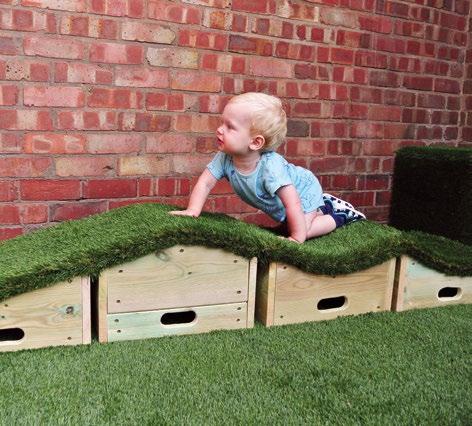
Nurseries across the group help raise more than £15,000 for UK’s leading charity for children’s play in hospitals and hospices.
Raising money for charities at nursery settings can have so many benefits.
While the good causes themselves benefit from increased exposure and more money in their coffers, children can learn how other people can find themselves in situations in life which are different to their own.
More than 80 Family First nurseries recently turned their settings into wonderlands and invited in children and local families for their Spring Playdate event.
In total, the teams raised more than £15,000 for Starlight – the UK’s leading charity for children’s play in hospitals and hospices, who work to ensure every child experiences the power of play.
The charity advocates play during a child’s treatment and recovery from illness as it can reduce fear, pain and trauma, and their ethos perfectly chimes with Family First’s own ideas around how important it is.
James Chaplin, Director of Nurseries at Family First said: “We were blown away
“It was an opportunity for everyone to come together as colleagues and families to have some fun, whilst supporting the incredible work of Starlight. Thank you to everyone who came along and donated.”

by the support and generosity from our families at our Spring Playdate.
“It was an opportunity for everyone to come together as colleagues and families to have some fun, whilst supporting the incredible work of Starlight. Thank you to everyone who came along and donated.
“Partnering with charities at both national and local levels is so important and I am proud of the effort all our teams put in to make the events attractive, exciting and help raise money.”
Ellingham House Day Nursery in Hampshire brought in more than £1,600 in fundraising through their own individual event.
Manager Amy Thorne said: “The feedback from

parents has been so positive about having the opportunity to come in, see the nursery and spend time with our teams. “They also gave us fantastic support with the selling of raffle tickets and local businesses helped with some brilliant prizes.
“Not only was it great to raise so much money, but an event like this was also a massive morale boost for the team and the positive feedback continued all week.”
The Beaconsfield Day Nursery and Pre-School in Buckinghamshire raised more than £800 and were named the most creative fundraisers for their Pie a Practitioner stall.
Here, in exchange for a donation, youngsters could smoosh the brave nursery team with a messy pastry.
Nursery Manager Kelly Woodroffe said: “A lot of our curriculum is about empathy,
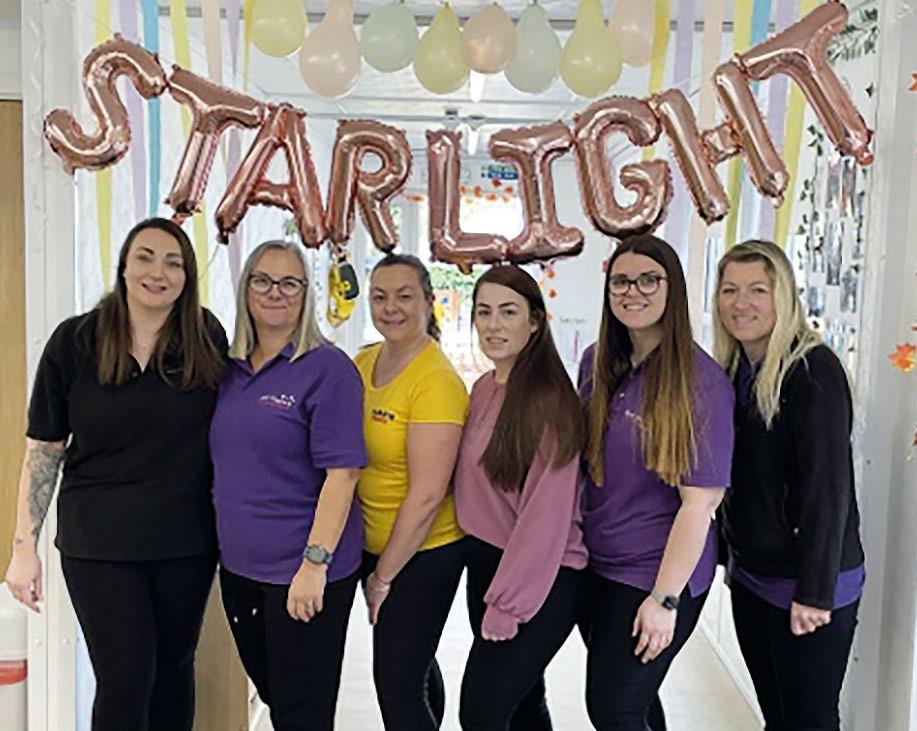
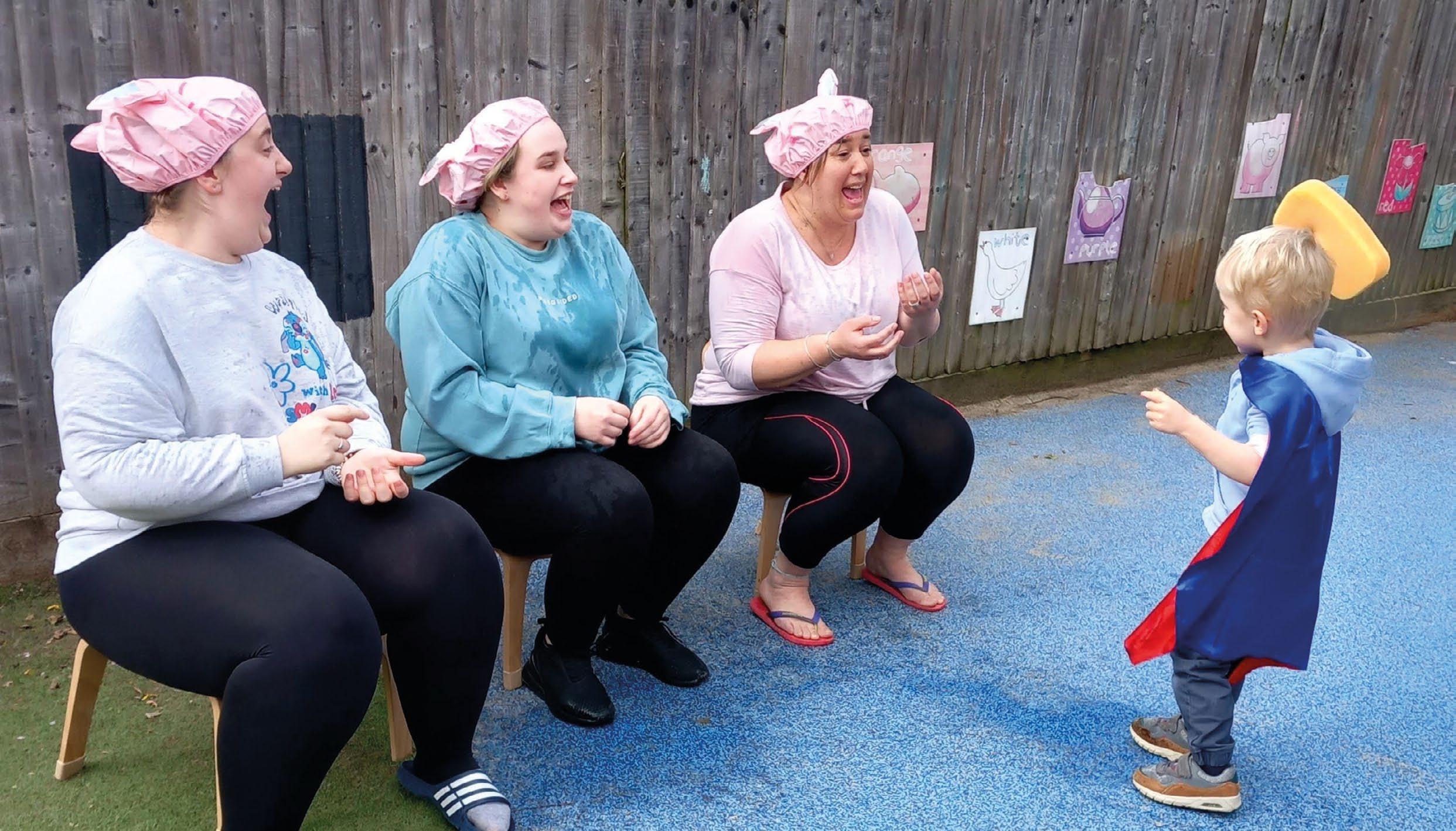
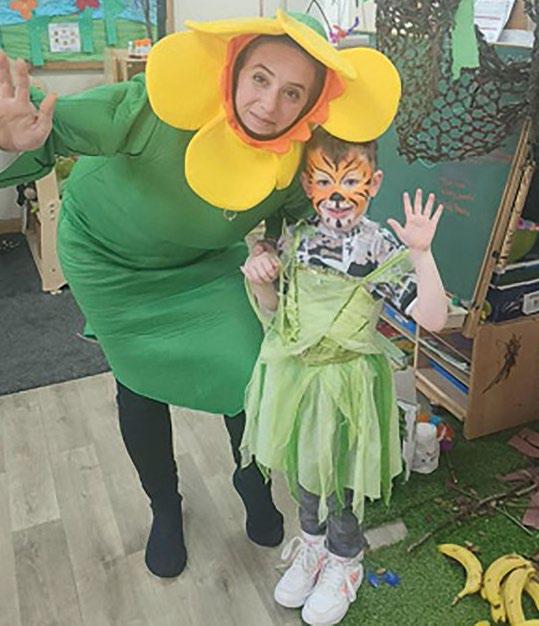
so we were happy a lot of the children were quite hesitant to start with.
“But once they realised it was all for a good cause and for fun then they joined in and enjoyed it.
“It was great to have all the team involved and we had more than 80 families come and visit us – some who have children here and some new families too.”
The Beaconsfield team encourage charity and community initiatives throughout the year including supporting ventures like Red Nose Day, and being a main drop-off point for One Can Trust – a local foodbank where children assist with delivering what has been donated.
“It helps them become better people and prepare them not just for when they
go to school, but for life too,” Kelly said.
“It helps to reinforce that people have different backgrounds and face different challenges.
“Now we’ve been introduced to Starlight, we hope we can continue to support them in the future.”
The team at the Old Windsor Day Nursery & Pre-School were named the wackiest fundraisers after coming up the idea to Soak the Management where Kelly Panter, Manager, and her leadership team were sopped with sponges.
“It was great to see everyone getting involved and I think it was the rest of the team who were encouraging people to get closer,” Kelly said.
“As well as a lot of our current families, we had prospective ones come along too.
“Them being able to speak to other parents was beneficial and we had a child sign up on the day.
“We try to make ourselves a big part of the community and have previously done baby bank collections. This helps the children understand there are people who are less fortunate than themselves.
“Raising money for Starlight also gave us the opportunity to talk about how some children find themselves in situations where they aren’t able to do fun things, while they get to play every day at nursery.”
Sarah Woods, Director of Fundraising and Marketing, at Starlight said the
charity was grateful to Family First for helping to spread the message about the importance of play.
“We’re hugely grateful to everyone at Family First for putting on such a wonderful Spring Playdate for local families and to everyone for attending and raising funds for Starlight,” she said.
“Play is not just a nice to have, it is vital in helping to alleviate anxiety, isolation and fear when children are in hospital, so we can’t thank them enough for their support.
“The money raised at the event will help fund our vital services such as our range of boxes containing toys and activities for children in hospitals and hospices around the country.”■








Whether it is sharing ideas, supporting their teams or getting involved in the local community, nursery managers across the country are going that extra mile. We round up some of the things you’ve been getting up to

A Kidzrus nursery, The Lodge in Swinton, Manchester, has launched a coffee bar for parents. Manager Debbie Moss said: “It’s a great idea for busy parents who don’t have time for themselves in the morning as they need to sort the children out, so to grab a quick coffee and a snack to enjoy on their journey to work is the perfect start to the day.”
Kidzrus coffee bars are being rolled out across all of the organisation’s five nurseries, as a way to boost parent partnerships. Parents can help themselves to a selection of coffees to go and have a chat with the manager or a member of staff.
“We find that some parents don’t really engage, and this little welcome is really making a difference, especially with many of our dads,” says Kidzrus director Nicola Fleury. “It’s wonderful to have an area to relax and unwind, and quite often parents with children who are settling in like to sit at the coffee bar knowing they are close to their children and we’re available to answer any questions to reassure them during these times.”
The coffee bars have proved to be a social area where parents can chat with each other and create new friendships, often arranging meet ups and play dates
outside the nursery. One parent said: “I’m in such a rush each morning; it’s a really good idea and the coffee is lovely too. I take a few minutes to sit and think about my day ahead and have a little catch up with the lovely staff.”
Kidzrus plans to extend the area for parents to include a workstation for short sessions. Branded material and a logo have been included in the area, to help promote the nursery group.
If you go down to the woods… Rosemary McNamara, regional manager of Little Lodge Nursery in Worcester, came up with a creative idea to share the setting’s love of books with the local community. Ten books were hidden in the local woods for children to find to celebrate World Book Day.
“At Little Lodge Nursery we are passionate about reading with all of our children and we love nothing more than getting lost in the magic of a book with our children,” said manager Vicky Turrell. “We hope that we will have sparked children’s love for books as they find them. While one of the books was being hidden it caught the attention of a child playing and after the book had been left he excitedly ran over to see what it was. We later received a message from one of
our families to say that while out for a walk in their favourite place they have found one of the books, the little boy was “super chuffed” to have found a book from his nursery.”

Earlier this year Fennies Nurseries held its first annual conference for managers and deputies. The conference provided an opportunity to showcase each department’s role in supporting the wider Fennies team and engage in Q&A sessions. Delegates took part in activities including making hats with the education team, taking part in a quiz with the learning and development team – and receiving a surprise visit from a Ifty, a Magic Circle magician.
The managers were treated to a delicious three-course meal hosted by chief people officer Steve Gill and chief executive Steven Fenn, during which individuals who have demonstrated exceptional dedication and made significant impacts were acknowledged.
“This event served as a turning point in how we guide and empower our

nursery management teams,” said regional manager Nicola Reed. “We were able to articulate the vision for 2024, reinforce and build on our ever-growing company culture, and emphasise the importance of collaboration among supporting functions to ensure the best outcomes for our families. Fennies already boasts a unique support structure, focusing on empowering managers and teams to achieve excellence in quality and sustainability. During the conference, the leadership team united to showcase upcoming projects and enhancements planned by the support team.”
An Essex nursery found itself going viral when a video of staff members singing Five Little Ducks attracted more than 352,000 views and over 15,000 likes. Jade Kennedy, Daisy O’Brien, and Trinity Gilders, staff at Munchkins Nursery & Pre School in Brightlingsea, created the video under the auspices of Lottie Hayward, who works in digital marketing across Munchkins’ six settings.
Hayward finds light-hearted TikTok videos celebrating childcare have a positive effect on recruitment, particularly for the younger generation. “When potential new staff members are researching the company, there’s a lot of insight into what it’s like being a part of the team and this is so beneficial,” she commented.
The nursery group’s TikTok videos, which usually get around 8,000 views,
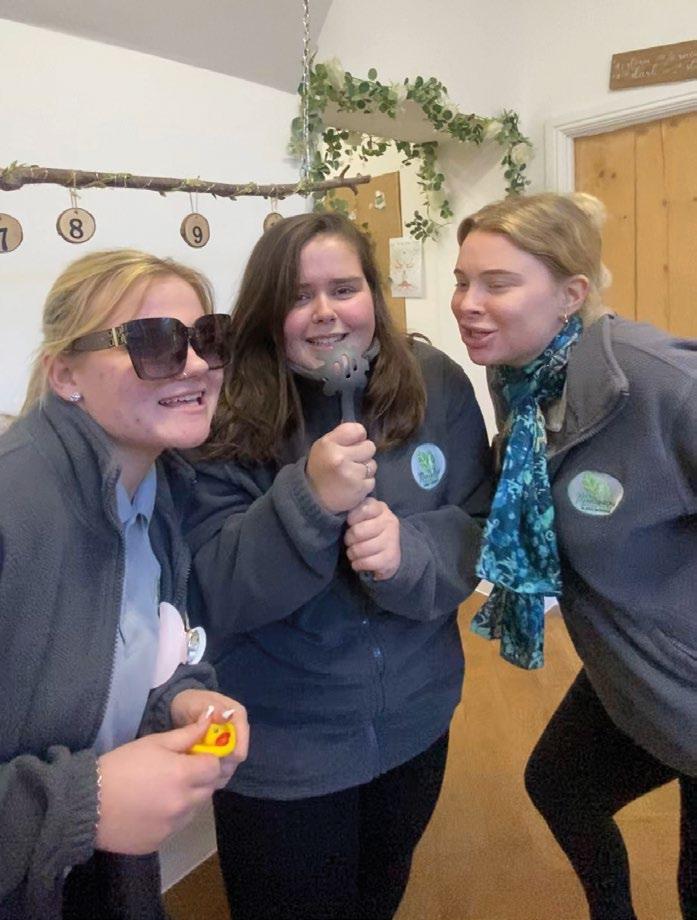
are also great for driving occupancy. One parent commenting under this particular video: “Where are you based? This is the nursery my daughter needs!”.
Hayward added: “We have had potential parents mentioning our TikToks when they were being shown around the nursery, and they have said they loved seeing our environments being played with more than anything.”
When the Five Little Ducks video started racking up the views, Hayward made sure to alert the local newspaper, promoting the setting even further online. “By the time they uploaded the story, the views had increased even further, so they had to update it,” she laughed. “We have gained a lovely wave of followers who comment and engage in our content.”
Creature feature
Children at Badgemore Pre-School in Henley-on-Thames unearthed the UK’s rarest newt in their garden, the great crested newt. The find has been officially recorded by the Thames Valley Environmental Records Centre (TVERC).


Manager Angela Schofield said: “We are very excited about finding such a rare newt. We contacted Froglife and TVERC to get confirmation that it was definitely a great crested newt. They also explained that this is possibly the first registered sighting in Henley-on-Thames.”
Since the find, staff and children have noticed more rare animals in the gardens, including stag beetles and slow worms. “We have done some investigating to where they are coming from and have concluded they are coming from our pond area,” said Schofield. “As a result, we are going to be restoring our pond to help the rare species thrive. We believe it is very important to promote their survival and protest their habitats.”■
We know managers are doing fantastic things all around the country, If you have an achievement or a new initiative you’d like to share, contact: charlotte.goddard@ nexusgroup.co.uk
Clare Stead, founder of the Oliiki app shares her insights and strategies to support engagement between nurseries and parents
The learning and development requirements section of the Early Years Foundation Stage’s statutory framework sets out what providers “must do, working in partnership with parents and/or carers to promote the learning and development of all children in their care and to ensure their entire early years’ experiences contributes positively to their brain development and readiness for key stage 1.”
But what does this actually look like in practice? How do we effectively work in partnership with parents and carers, and what does “contributing positively to brain development” actually mean?
The school readiness survey published each year by charity Kindred Squared highlights the growing issues of ‘school readiness’, with 43% of parents reporting not even having heard about the concept or its connection to milestones before the age of four. The survey also points to a difference in understanding between parents and teachers of the requirements for school readiness. Another challenge is a lack of understanding of where the responsibilities lie in helping children prepare for starting school. 69% of school staff think parents should receive more guidance to help them understand child development.
The experiences and environments
“The experiences and environments children encounter from pregnancy through early childhood and beyond play a significant role in allowing them to reach their full potential and build their brain.”
children encounter from pregnancy through early childhood and beyond play a significant role in allowing them to reach their full potential and build their brain.
Yet, research published by The Royal Foundation with Iposos MORI in 2020 found that only 11% of parents found out about child development before the birth of their first child, and “fewer than a quarter of respondents (24%) understood the importance of the first five years as the most important period in a child’s life for future health and happiness, and nearly two-thirds (64%) of parents were unaware of the unique period of brain development during the time from conception two.”
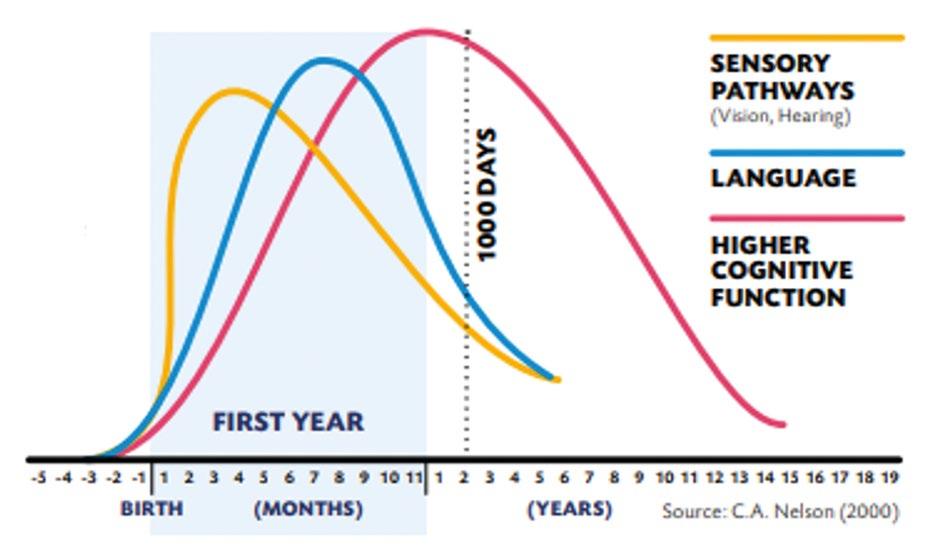
Learning happens from the simple to the complex, with each skill forming the foundation of the next. The way a baby’s brain develops is shaped by the tiny, everyday conversations, play, relationships and interactions they share with parents, carers, and practitioners. The first 1,000 days affect every part of a child’s life –academic success, health and mental wellbeing, concentration, resilience, and even their social development.
Skills learned in these early days are the foundations on which the rest of learning is built. This is why we produced the Oliiki app, which helps parents and parents-to-be spark their baby’s adventures in learning in the first 1,000 days of life.
As a result of these first 1,000 days, parents become a vital part of supporting the building of a child’s foundation for learning. A wide range of research shows that the way parents and nurseries interact with their babies predicts their later development.
With the decrease in health visitor
numbers, however, many parents lack understanding of child development and the impact they have on their child’s outcomes. 22% of parents say they have never seen a health visitor and 63% say they have had between zero and two appointments. Nurseries are increasingly becoming the first consistent place that parents can find trusted information. As educators, we often talk about ‘building strong parent partnerships.’ At their best, strong parent partnerships enable an alignment of goals between the parents and educators. Setting


common learning and development objectives and milestones for the child ensures a consistent approach between the nursery and home, enabling the reinforcement of key concepts and skills. Repetition in this way provides strong brain building opportunities, which are so vital, particularly in the early days. Strong partnerships enable information to be shared freely between parent and practitioner. When parent partnerships are strong, trust is formed, enabling collaborative problem-solving when issues arise.
• Parent partnerships are two-way things. Consider them from both sides. You may understand what you mean by a ‘parent partnership’, but do the parents know what is expected of them? Have you shared with the parents what parent partnership success looks like in your setting? Are your staff on board as well?
• You are inviting parents into your setting, and they are trusting you with their precious child. Understand that first-time parents, especially, are still learning how to be a parent. Approaching the relationship with
empathy and understanding can be transformational.
• If 64% of parents don’t understand the first 1,000 days’ importance for brain development, you can pretty much guarantee that most of your parents have little or no understanding of the impact they have on their baby’s life outcomes. So, tell them how amazing and important they are for their baby’s development. Use the first look around the nursery to share information with them. It will give them confidence that you know your stuff, and will build trust.
• With only 11% of parents learning about child development before the birth of their first child, it’s almost certain that every parent that arrives in your setting has little or no understanding of play for development. Tools like the Oliiki app will help them understand the power of play. Its evidence-based information will help your parents understand not only the kind of activities to undertake with their child each day, but will also give them an understanding of what their baby learns from the activity. (It’s a brilliant way to upskill practitioners too). And because it starts from the
first day of conception, you can bring parents into your community even before their child enters your nursery.
• Share learning that happens in the nursery with parents at the end of the day. Rather than sharing the activities a child has done, share the learning they gained from the activities. It gives more status to learning through play and helps parents understand your mission to develop the children in your care through daily play.
• Celebrate the wins parents have. Remember they are learning in the same way their child is learning. Everyone loves to be recognised for their successes.
• Build a community. Help the parents feel you care about them as much as you care about their child. Connection is hugely powerful.
When we get the parent partnership right in the earliest of days, we set the foundation for all the rest of the parent partnership relationships through the child’s education journey. If your setting doesn’t start until age two, don’t worry –why not still support your parents from sign-up? It will give you a much stronger foundation on which to build when their child starts in your setting.■
In our series showcasing the sector’s nursery managers, we talk to Sheryl Snook, nursery manager at Bright Horizons’ Cheshunt Day Nursery and Preschool in Hertfordshire
What was your route to becoming a manager?
I always knew I wanted to work with children from a young age. There is a big age gap between my youngest cousin and me and I loved looking after him and my passion for working with children stemmed from spending time with him.
I studied my Level 2 in childcare and education in college, followed by my Level 3 in childcare. I worked as a nanny for a family for two years before working in day nurseries. I decided that I wanted to climb the ladder and be a nursery manager that makes a difference.
I then enrolled onto Level 5 in childcare and management and started to progress and climb the ladder. I have now been a manager for over six years, three at Bright Horizons, and I wouldn’t change my job for the world.
What’s the best thing about Bright Horizons’ Cheshunt setting?
The best thing about my nursery is the environment. The nursery is a Grade II listed building which is beautiful in itself, but the practitioners and myself are also able to add our own stamp on each of the rooms. The nursery consists of many themed areas in line with the children’s interests such as a jungle themed room, which has previously been a spaceship.
What’s your next career move?
I’m really looking forward to my next adventure as a nursery manager starting at
“I decided that I wanted to climb the ladder and be a nursery manager that makes a difference.”
the brand-new setting, Bright Horizons’ Bishop’s Stortford Day Nursery and Preschool, this summer. I’m so excited to be a part of the purpose-built nursery and welcoming new families and a team of passionate practitioners who are eager to get started. The new nursery will be focused on nurturing and developing each child to reach their full potential and I can’t wait to be involved in the early stages of their education.
What’s the best training you’ve been on?
I recently attended a coaching training course which allowed me to adapt and apply my skills to support my team. Also, I attended a training day in Northampton with guest speaker Ben Kingston-Hughes, author of Why children need joy: the fundamental truth about childhood. He is a play therapist and shares his knowledge about children’s brains, how they develop and why they need ‘joy’. He speaks with such passion sharing his own life experiences to educate professionals which was truly inspiring.
What’s the most challenging part of being a nursery manager? The many different hats I wear each and every day – ranging from cooking in the kitchen to unblocking drains as a dinosaur has made its way down the sink, again!
Which three people, living or dead, would you invite to a dinner party? It would have to be Queen Elizabeth II. I would love to know more about her life on a personal level, especially as she became Queen at a such a young age. Another would be Jacqueline Wilson, I am a huge fan of her books – I’d love to know more about her and her life experiences as an writer. Lastly, I would invite my younger self to dinner and share my knowledge and wisdom with my younger self.

What do you do to look after yourself when things get stressful? I have recently enrolled at a local gym and I have also started training with a personal trainer. We do a mixture of cardio, boxing and weights which is a great stress release.
What’s the one thing you would change about the early years sector? It would be the perception of the childcare sector as unskilled People have often said to me: “But you just play all day”. Working in a nursery takes a special type of person who works selflessly, often for long hours, to provide a stimulating environment for the children to feel safe and secure.
What three things would you take to a desert island?
Suncream, if I look at the sun I’m sunburnt. I’m also a foodie – so lots of food, preferably steak – and a barbeque to cook it on.
What advice would you give your younger self?
Don’t worry about other people’s perception of you – you are doing a great job and you will achieve everything if you work for it – and more.■


Recently-launched changes to funded childcare support have placed a huge burden on already stretched nurseries and enhanced the need for innovative methods to attract new recruits into the sector.
Imagine the prospect of welcoming a new recruit into your nursery, equipped with training and ready to begin a Level 3 apprenticeship in a matter of weeks. Throw in a potential saving of £30,000plus and there will barely be a nursery manager in the country whose eyes don’t light up.
As well as the usual day-to-day challenges which comes with being in a leadership role at an early years setting, the new and expanded eligibility around funded childcare has added more than just one extra layer of complexity.
However, the introduction of Skills Bootcamps may well have provided a lifeline for settings. At Realise, we were proud to deliver the first ever Department for Education-funded Skills Bootcamp in Liverpool in February.
Four learners embarked on the course and, I’m delighted to say, by April three
“The premise of Skills Bootcamps is simple. Anyone aged 19 or over and not currently employed in the early years sector is eligible to sign up for the Skills Bootcamp free of charge.”
of those have found employment. One of those four is about to embark on a Level 3 early years practitioner apprenticeship.
The premise of Skills Bootcamps is simple. Anyone aged 19 or over and not currently employed in the early years sector is eligible to sign up for the Skills Bootcamp free of charge.
At Realise, we are delivering six-week online Skills Bootcamps across the country. In addition and in selected locations, face-to-face training is available to learners over a three-week course.
Our in-person sessions were originally targeted at Liverpool, Northampton, Slough and Kent, but a surge in interest has meant we are already investigating other areas of England to launch Skills Bootcamps.
In total, we have set ourselves an initial target of recruiting 650 people to the short courses, and that’s potentially 650 new people taking jobs in nurseries –with the power to add many more in the future.
Individuals who complete the course will be guaranteed an interview for a job with a local nursery and, given the Skills Bootcamp is an apprenticeship accelerator, individuals will automatically be eligible to begin a Level 3 apprenticeship when they secure employment.
The benefits from this new programme are numerous. It is a real opportunity for people who are currently unemployed, in another job but looking for a new career, or people who have worked in early years previously and are now looking to return to the sector.
While the learner has the chance to take the first steps to forging a new career, for nursery settings it’s

“It is a real opportunity for people who are currently unemployed, in another job but looking for a new career, or people who have worked in early years previously and are now looking to return to the sector.”
an opportunity to add another Level 2-qualified team member to their ranks once they are considered competent by the nursery manager.
But the benefits to the nursery don’t end there. As well as having ready-made new recruits there’s a very significant financial saving which could be made by embracing Skills Bootcamps. The most eye-catching of these cost efficiencies are

“The other interesting element to note is that Skills Bootcamps aren’t only accessible to those who are new or returning to early years.”
the £13,000 saved in wages to cover the period it would have taken a new recruit to complete a Level 2 apprenticeship, not to mention the £15,000-plus reduction in spend on agency staff provided by securing a qualified employee. Throw in an extra £3,200 for
recruitment costs – for a Skills Bootcamp the learner is found for the nursery rather than vice versa – and some minimal costs on paediatric first aid, DBS application and the cost of training, and there’s a potential saving in excess of £30,000.
The other interesting element to note is that Skills Bootcamps aren’t only accessible to those who are new or returning to early years. They are equally as beneficial for those working in a nursery but yet to secure a Level 2 apprenticeship, although the employer must contribute 10% of the costs if it’s an SME or 30% for large operators in this scenario.
In short, the apprenticeship accelerator Skills Bootcamps has significant potential to provide a major influx of
new and qualified talent to the early years industry.
It’s a route that nursery managers can ill-afford not to contemplate at this time.■
“In short, the apprenticeship accelerator Skills Bootcamps has significant potential to provide a major influx of new and qualified talent to the early years industry.”
Connect Childcare’ chief executive Chris Reid shares his views on how technology can support equality, diversity and inclusion.
Technology has the potential to revolutionise the way early years educators provide high-quality learning experiences tailored to meet the diverse needs of children.
Achieving this level of personalised care requires staff to invest time in understanding each child as a unique individual. Observation tools in your software are invaluable for tracking a child’s behaviour, interests, developmental milestones, and any additional needs they may have. These online tools enable staff to gather insights into how each child learns best and what sparks their curiosity. By compiling these observations, a comprehensive report of a child’s development can be created.
The use of such apps also streamlines paperwork, freeing up more time for staff to focus on meeting each child’s specific needs. Through observations, educators can identify and address any concerns promptly, ensuring that children don’t feel excluded from their peers.
These tools promote inclusivity, helping to create an environment that fosters each child’s growth and development.
An effective way of achieving diversity and inclusion is through digital communication platforms that keep parents informed and engaged in their child’s learning journey, regardless of their location or daily routine.
When families share their unique experiences, traditions and cultural backgrounds with the setting, it promotes mutual understanding and appreciation. Staff can leverage these insights to explore and incorporate those perspectives into the child’s learning journey.
Communication apps can also be useful for parents who don’t speak English as their primary language. These apps have features for receiving messages from staff, managing finances, checking booking calendars, viewing their child’s developmental progress, and accessing educational resources. Parents can improve their English skills, access valuable resources, stay connected with their children’s education, and navigate life in a new country more confidently. Furthermore, translation apps such as Google Translate can supplement websites, bridging language barriers and facilitating seamless communication.

facilitate the collection and reporting of crucial data points, including child ethnicities and spoken languages. By leveraging these insights, nurseries can comprehensively analyse their diversity metrics. The statistical information derived from these reports can then be strategically integrated into the nursery’s marketing materials to showcase progress in building an inclusive environment.
“An effective way of achieving diversity and inclusion is through digital communication platforms that keep parents informed and engaged in their child’s learning journey, regardless of their location or daily routine..”
Nursery management software can be a powerful tool for nurseries looking to showcase their commitment to diversity and attract more families. These systems help track parent preferences from the initial enquiry stage, streamlining administrative tasks and enhancing engagement with their diverse audiences.
Advanced nursery management platforms can offer features that
It’s important to encourage families to share their traditions, stories and experiences with the nursery community. They establish open channels of communication with families to address any concerns and gather feedback on diversity and inclusion efforts.
By using these software solutions, childcare settings can effectively communicate their dedication to diversity and inclusion, creating a positive brand image, and attracting parents/families who value these principles.
Leveraging nursery management and communication software such as Connect Childcare, can significantly

enhance a nursery’s ability to uphold and communicate its commitment to diversity and inclusion.
Nursery communication software can create seamless communication with parents through newsletters. These updates provide insight into the nursery’s commitment to diversity, highlighting upcoming events and ongoing initiatives. Parents stay informed about diverse experiences for their children and are encouraged to join in creating an inclusive space.
With specialised software, staff create detailed digital profiles for each child, including cultural background, home languages, and diversity-related needs. This allows for tailored care, ensuring sensitivity to traditions, language preferences, and dietary requirements. Such personalised attention fosters an inclusive, welcoming environment where every child feels valued and understood.
The nursery software provides valuable data insights for staff to enhance diversity and inclusion efforts. Staff generate reports on nursery demographics, understanding the varied backgrounds of attending children. This helps tailor approaches to meet individual needs.
Additionally, the system tracks staff completion of diversity training, ensuring educators are well-prepared to foster an inclusive environment.
Managers use these insights strategically, identifying strengths and areas for improvement. For instance, if reports highlight a need for more EDI training, managers can act proactively. These datadriven tools empower the nursery to enhance practices continually, ensuring every child experiences quality care in a diverse and inclusive setting.
Nursery management software and parental engagement apps offer powerful tools for nurseries not only to manage operations efficiently, but also to create, communicate and sustain a culture of diversity and inclusion.
Connect has assembled a varied team of developers and testers over the past two decades. This diversity encompasses individuals from different backgrounds, cultures, genders, ages and cognitive styles. Such diversity in the team guarantees that various perspectives and experiences are incorporated during the software development process.
Connect Childcare places considerable emphasis on inclusive design practices. For instance, its product, iConnect, provides a user-friendly interface that goes beyond basic accessibility standards. Users can customise font colours, contrast ratios, and other settings according to their individual preferences and requirements. This level of customisation ensures that users with diverse needs, such as those with visual impairments or colour blindness, can comfortably use the software.
When designing new features or functionalities for software, it’s crucial to consider the diverse needs of the user base and regularly seek feedback. This inclusive approach to feedback collection ensures that nurseries hear from users with various backgrounds, abilities, and preferences. This feedback can then be meticulously analysed and used to iterate on the software, making improvements and adjustments based on the diverse needs of the user base.
By implementing these strategies, nurseries using innovative nursery management technology can prioritise diversity as a central principle in their software development.■
A pair of London day nursery operators have purchased Dees Day Nursery in Wimbledon which has capacity to care for up to 30 children aged from three months to five years.
Dees Day Nursery was established in 2007 by vendor Karthika Kaneshanathan and operates from a converted residential property.
Business property advisor Christie & Co facilitated the sale and funding was sourced through Christie Finance.
Sophie Willcox, director, childcare and education at Christie & Co, said: This is another example of a freehold sale that is supported by a strong staff team and underlying property value making it an excellent addition to the buyers’ existing settings.”
Dees Day Nursery was sold for an undisclosed price.

Childminder Estella Wilmott has acquired the leasehold of Inwood Nursery in Congresbury, North Somerset, which has an effective operating capacity for up to 46 children aged from six weeks to five years.
Wilmott is experienced in the sector and plans to bring her existing staff in-house and to increase occupancy immediately by welcoming her childminding children to the nursery.
Business property advisor Christie & Co facilitated the sale and funding was sourced through Christie Finance. Inwood Nursery was sold for an undisclosed price.
Kids Planet Day Nurseries has purchased the freehold of Marigold Day Nursery in Heswall, Merseyside.
The nursery has an effective operating capacity for 64 children aged from newborn to five years old. It operates from a site comprising two properties and an extensive outdoor learning environment for a forest school offering.
The business was established 26 years ago by owners Tina Muscatelli and Kathleen Moore, who are retiring. Kids Planet Day Nurseries now owns 163 settings.
Tina Muscatelli, previous owner of Marigold Day Nursery, said: “After 26 years of building Marigold Day Nursery into the wonderful and well-loved setting that it is, the time has come for me to retire. My number one priority was to hand over the reins to the right new owner who could take the nursery forward, whilst retaining the same values and homely feel that are so important to our families. I believe that Kids Planet
are the best choice for this. I am confident that the amazing staff and children at Marigold are in the safest hands and that the nursery will continue to thrive.”
Clare Roberts, chief executive at Kids Planet Day Nurseries, commented: “A warm welcome to the whole team at Marigold Day Nursery. This family-feel setting aligns well with the Kids Planet approach and we look forward to supporting the team, children and parents in becoming part of the Kids Planet family.”
Business property advisor Christie & Co brokered the sale.
Sofia Beck, associate director, childcare and education at Christie & Co, said: “With so many benefits and emphasis in the EYFS towards outdoor learning, a day nursery’s outside area can often be its biggest selling point.”
Marigold Day Nursery was sold for an undisclosed price.



National operator Kids Planet has acquired Teddybears Day Nursery in Denton, Greater Manchester.
Established in 1999, Teddybears focuses on the Montessori approach and curriculum and has capacity for up to 102 children aged from newborn to five years.
The nursery operates from a two-storey detached property which has been converted and renovated and comprises four individual playrooms.
Vendor Sofia Savrioni felt the time was right for her to exit the sector.
Business property advisor Christie & Co facilitated the sale. Sofia Beck, director, childcare and education at Christie & Co, said: “Teddybears is a great example of a strong performing day nursery business located in an area where fee rates are lower than the market average. Due to its large size and exceptional local reputation, the nursery has proven to be consistently successful under Sofia’s ownership. The setting is a great fit, both operationally and geographically, for Kids Planet following their recent acquisitions within the Tameside area.”
Teddybears Day Nursery was sold for an undisclosed price.
The Ark Experience has acquired Little Lambs Nursery in Bolton, Greater Manchester, which can care for up to 50 children aged from newborn to five years.
Since 2018, the nursery has been owned and operated by Carly Morrison.
The Ark Experience is owned by Gourav and Priyanka Batra; this is the pair’s fourth nursery acquisition. Morrison said: “Despite the challenges of the current climate, we were able to find potential buyers swiftly.”
Gourav Batra, managing director at The Ark Experience, added: “Little Lambs is a very special nursery that delivers care that is bespoke for each child. We are very excited to have the nursery be part of our family. This is a phenomenal, outstanding setting with a culture that is centred around children which aligns perfectly with ours, and we look forward to supporting the team, children, and parents. This is our fourth nursery as the business has
grown from our first nursery The Ark and Space afterschool club in 2015.”
Business property advisor Christie & Co facilitated the sale. Sofia Beck, director, childcare and education at Christie & Co, said: “The transaction itself was not without its challenges which I believe, in part, reflects the current changing market. In bank-funded cases, we are experiencing longer deal times currently due to several contributing factors. With this in mind, I’d stress the importance of seeking the right advice from the offset if you’re considering the sale of your business.”
The purchase was funded through Christie Finance. Alena Ray, associate director at Christie Finance, commented: “In a challenging economic climate, we delivered a competitive funding solution that aligns with the existing group.”
Little Lambs Nursery was sold for an undisclosed price.
Nursery group Just Childcare has acquired Little Darlings Day Nursery in Stockport, Greater Manchester, which caters for 72 children aged from newborn to five years old. Just Childcare now owns 64 settings.
The nursery occupies a converted former pub property with a spacious outdoor learning environment located in the suburb of Offerton. The business was established by in 2009 by Anne Smith whore recently decided to sell to pursue new ventures outside the sector.
Smith said: “When I first set up the nursery, the ethos was to create a warm and nurturing environment that puts children and families at the heart of everything we do. The staff team have continued to build from there to create the outstanding setting it is today. It wasn’t an easy decision to hand Little Darlings over, but I felt the time was right for me to take on new challenges. I feel that I have left the nursery in safe hands and hope that Just Childcare continues the good work.”
Toni Kilby, M&A director (UK) at Just Childcare, commented: “We are delighted to welcome another outstanding nursery to our group. We are very much looking forward to working closely with the existing nursery team, providing the support they need to continue their great work and success and to enhance the experience for the children and families in their care.”
Business property advisor Christie & Co facilitated the sale.
Sofia Beck, director, childcare and education at Christie & Co, said: “When considering exiting, the new lease option has become a popular choice with nursery operators recently. This is where the original owner sells the business – goodwill – but keeps ownership of the property, creating a lease for the new provider and generating a reliable rental income.”
Little Darlings Day Nursery was sold for an undisclosed price.




An existing childcare operator has acquired A1 Fun Club, a children’s day nursery in Newmarket, Suffolk.
Established in 2003, the business was run for more than 20 years by vendor Tracey Ainge, who is taking early retirement.
Ainge said: “Even though getting the right price was important for me, it was just as important to get the right person to take over with my staff and families. I have so many emotions after having the business for 20 years,
but I knew the time was right for me.
Childcare and education business broker Redwoods Dowling Kerr facilitated the sale.
Redwoods Dowling Kerr’s childcare broker Stephanie Quinn said: “Tracey was an absolute pleasure to speak to during the process. I am so pleased for both Tracey and the buyer and wish them all the best in their new ventures.”
Childcare group Grandir UK has acquired College Town Montessori in Sandhurst, Berkshire.
The nursery was established 28 years ago as a 12-place setting by vendors Mike and Louise Sanderson and operates across two properties with capacity for up to 55 children.
Lydia Hopper, chief executive of Grandir UK said: “Mike and Louise have successfully crafted a stellar reputation providing childcare solutions to families in the local area. They have confidently left the nurseries in Grandir UK’s capable hands to continue to provide high-quality childcare where children will enjoy an enriched and unique range of education programmes. As a Great
Place to Work certified employer, the nursery teams will reap the rewards of being part of a larger group with benefits such as a dedicated resource to professional development and access to the savings and rewards and recognition employee platform, GrandCentral.
Childcare and education business broker Redwoods Dowling Kerr facilitated the sale.
Redwoods Dowling Kerr’s deputy manager Sarah Ellison stated: “It was a pleasure to assist Mike and the team at Grandir UK on the sale of College Town Montessori in Sandhurst. I wish Grandir UK the best of luck with their latest acquisition and look forward to continuing to assist them with their growth plans.”
A first-time buyer with experience of social care and healthcare has purchased Dolly’s Daycare in Ashford, Kent, a purpose-built children’s day nursery founded in 2016, with capacity of 32 children aged from two to five years.
Childcare and education business broker Redwoods Dowling Kerr facilitated the sale.
Redwoods Dowling Kerr’s childcare broker Sarah Ellison stated: “It has been a pleasure working with [the vendor]. She came to the market due to her wish to emigrate with her family later in 2024. It was a sale of mixed emotions.
She has run the business since 2016 but has been in the industry for over 30 years and wanted it to go to the right person for her staff. When meeting the purchaser, she knew the business would be in good hands for the future. We would like to wish both all the best for the future.”
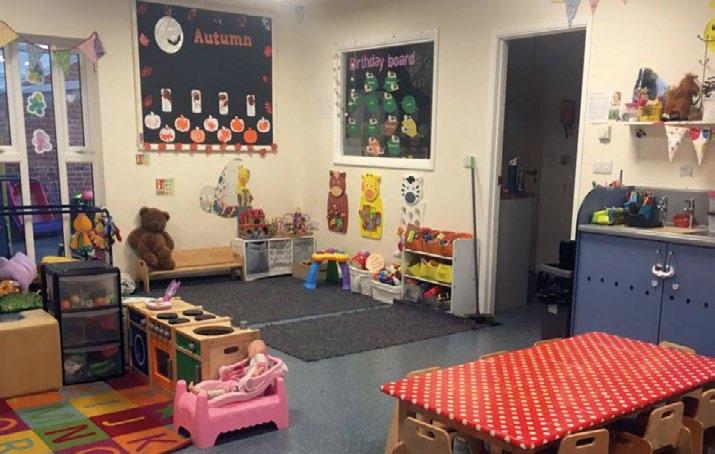


A first-time buyer has purchased Parr’s Playhouse Childcare, a children’s day nursery in Burton-upon-Trent, Staffordshire, which is registered for 44 children.
Childcare and education business broker Redwoods Dowling Kerr facilitated the sale.
Redwoods Dowling Kerr’s childcare broker Karrina Lee said: “I was thrilled to have completed the sale of Parrs Playhouse. I wish both the vendor and the purchaser every success in the future.”

National childcare provider Kindred Education has purchased St Nicholas, a purpose-built day nursery established 20 years ago in Lincoln, which has capacity for up to 101 children aged from newborn to five years old.
Kindred now operates 42 nurseries and three out-ofschool settings.
Childcare and education business broker Redwoods Dowling Kerr facilitated the sale.
Redwoods Dowling Kerr’s childcare broker Karrina Lee said: “It was a pleasure to work with the vendors to help them secure a sale. We would like to wish them all the best in their new ventures. We are positive that St Nicholas Day Nursery will make a great addition to Kindred Education.”
Sadco Nursery Group acquires Fife nursery
Sadco Nursery Group, owners of Noah’s Ark Nursery in Lochgelly, Fife, has acquired Sunshine Nursery in Fife, a setting with capacity for up to 47 children.
Sadco Nursery Group have owned Noah’s Ark Nursery since last year. The owners, Saqib and Amir Sadiq, come from a family with two decades of experience in the childcare sector.
The purchaser plans to upgrade their new setting. Childcare and education business broker Redwoods Dowling Kerr facilitated the sale.
Redwoods Dowling Kerr’s childcare broker Stephanie Quinn stated: “It was a pleasure to assist with this sale. Both the buyer and vendor were great to work with. It was a very smooth transaction. I wish them both all the success in their new ventures.”

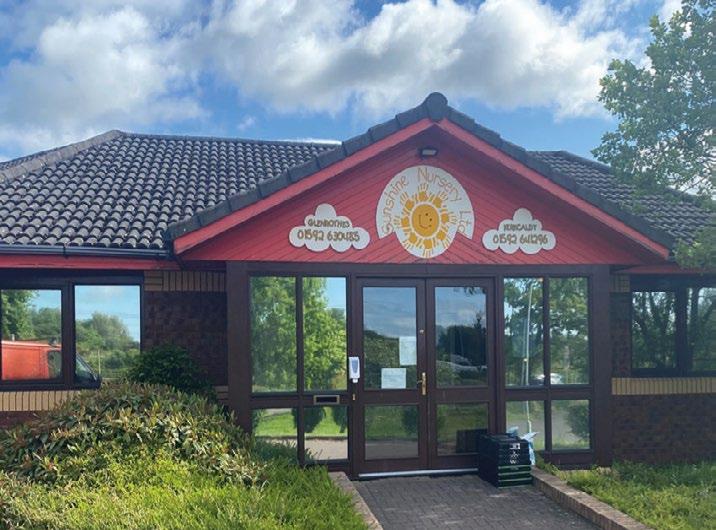
To find out more details about the businesses available for sale, and sold, through Redwoods Dowling Kerr please visit: www.redwoodsdk.com
CHRISTIE & CO
SCOTLAND
Martin Daw 0131 524 3406
Rosie Adlem 0131 524 3401
CHESHIRE / NORTH WEST
Sofia Beck 0161 833 6915
EAST MIDLANDS
David Eaves 07711 767094
WEST MIDLANDS
Jassi Sunner 0121 452 3708
YORKSHIRE / NORTH EAST
Vicky Marsland 0161 833 6914
LONDON
Sophie Willcox 0203 846 0619
David Eaves 07711 767094
SOUTH WEST
Jassie Sunner 0121 452 3708
Rachel Godwin 07701 315 061
PORTFOLIO TRANSACTIONS
Courteney Donaldson 07831 099 985
Nick Brown 07764 241 316
REDWOODS
Jenna.Caldwell@redwoodsdk.com
Karrina.Lee@redwoodsdk.com
Sarah.Ellison@redwoodsdk.com
Kim.Emsley@redwoodsdk.com
Robert.Yates@redwoodsdk.com


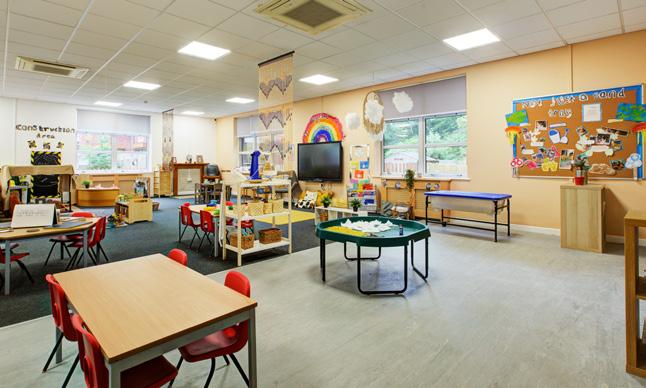


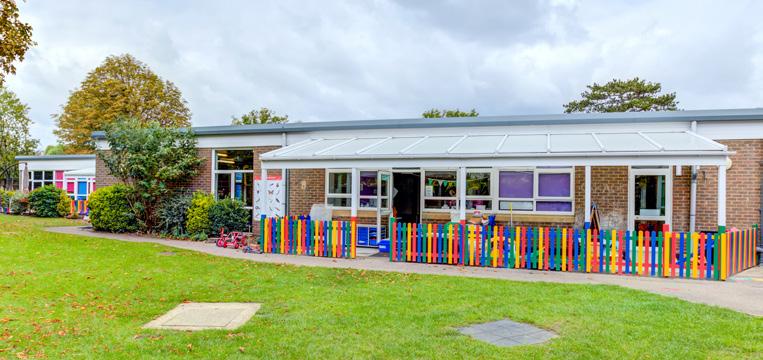


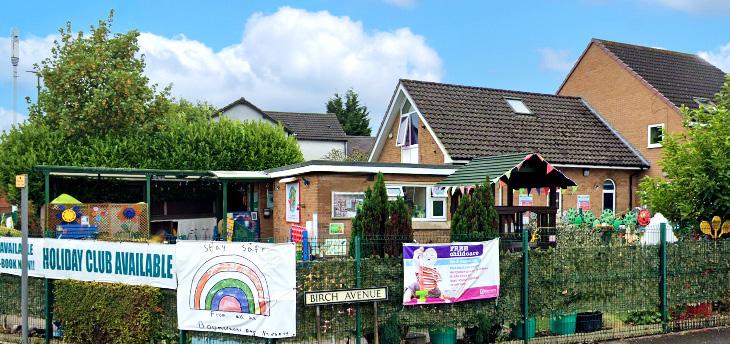
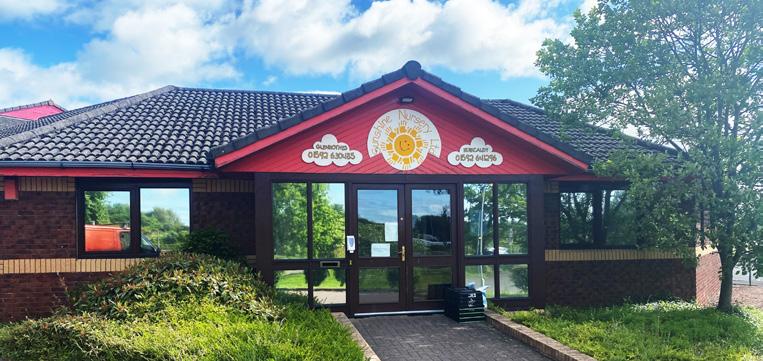
















4280834 - Lancashire

Freehold, £800,000
• Sought after village location
• Former school property
• Scope to increase capacity
T: 07736 616 687

5280067 - East of Scotland
Freehold / Leasehold, Offers Invited
• Capacity for c. 50
• Rated 'Good' with Care Inspectorate
• PP to expand to capacity for c. 90
T: 07754 559 529
Leasehold, £300,000
• Capacity for 65
• Turnover: £508,000
• Adjusted net profit: £75,000
T: 07701 315 061
3480018 - Gloucestershire


5880051 - Devon
5880129 - Shropshire

Leasehold, £180,000
• Capacity for 65
• Turnover: £365,000
• Adjusted net profit: £65,000
T: 07791 979 343
5280079 - Central Scotland
Leasehold, Offers Invited
• Capacity for c.125
• Turnover Y/E 2023:
c. £210,000
• EBITDA Y/E 2023:
c. £35,000
T: 07754 559 529


Leasehold/Freehold, £550,000/£900,000
• Capacity for 145
• Turnover: £565,000
• Adjusted net profit: £170,000
T: 07791 979 343
Leasehold, £495,000
• Capacity for 67
• Turnover: £540,000
• Adjusted net profit: £140,000
T: 07791 979 343

5880071 - Somerset
4280654 - Hampshire

Leasehold, £180,000
• Capacity for 47
• Adjusted net profit: £60,000
• Scope for further growth in profit
T: 07701 315 061

